SIXTH FORM PROSPECTUS 2026
A School of Great Character




As you look ahead to the exciting opportunities that await you in the sixth form, you may already be asking yourself what the best experience could look like for you. At Exeter School, our aim is simple: to provide you with a tailored education that not only challenges you academically but also helps you to grow as an individual, developing the skills and qualities that will serve you for later life.
For every sixth former, we offer much more than a set of subjects to study. We provide the chance to explore your interests, to develop your leadership and to make valued contributions to the school and wider community. We challenge you to discover new talents both inside and outside the classroom, whether your strengths lie in academic study, sport, music, drama, or another pursuit, there is space here for you to flourish.
When I was at school, the advice I received about subject choices was limited, and the range of options even more so. What stayed with me, though, was one key piece of guidance: pursue what you enjoy (and what you are good at). This simple principle remains true today. If you follow it, your sixth form experience will be engaging, rewarding, and fulfilling – not only for you but for those around you. It will open the right doors to future study or employment, and hopefully, ultimately to a fulfilled and happy life beyond Exeter School.
Of course, A Levels and BTEC form the core of what we do, but the sixth form at Exeter School is about so much more. It is about leadership, creativity, and service. It is about resilience, intellectual curiosity, and giving you the confidence to shape your own future. By the time you leave us, you will be ready for the challenges of university, apprenticeships, or the world of work. More importantly, you will also carry with you lifelong friendships and memories of some amazing experiences. You will be supported every step of the way by dedicated teachers, academic mentors, and our fantastic pastoral team. With every member of staff fully committed to helping you succeed.
Mr Graham Bone Head head@exeterschool.org.uk

Your time in sixth form is the start of the next chapter in your education, full of exciting new opportunities and challenges. These are crucial years in which you will study the subjects you have chosen, and they will go on to shape your academic journey towards higher education and your careers ahead of you.
Our Exeter School sixth form offers a stimulating and supportive environment where you will acquire the essential skills needed for increased independence, allowing you to fulfil your aspirations in life beyond school. You will have the opportunity to explore personal interests and broaden your understanding of what it means to succeed individually, and collaborate as part of a team.
Our combination of academic study, a wealth of co-curricular options and excellent pastoral care ensures a balanced education that helps you build your self-confidence, so you can bring out the best in yourself and others. Our shared commitment to the common good and the self-belief to make a difference, guided by lifelong virtues, empower you to make a valuable impact within the school, and throughout your community for years to come.
Our dedicated staff work hard to ensure that every pupil finds a suitable programme where you will flourish as you progress towards your aims, whatever they may be. At Exeter School most pupils will study four subjects through to the end of Lower Sixth (Year 12), with the option to carry on with three in the Upper Sixth. Some of you may choose to continue with all four into the Upper Sixth, whilst others among you will know that a three subject programme is the right pathway for you before the end of the Lower Sixth.
I hope this booklet excites you as you take the first steps towards making important decisions for your sixth form years. Personal guidance and support are always available to help you along the way, whether you are exploring individual subjects, our Futures programme, or the wide range of sporting, artistic, and cultural activities on offer. I hope this guide will help you take your next steps and should you wish to discuss any aspect of your sixth form journey further, please do not hesitate to get in touch.
Mr Paul Fennemore Deputy Head (Academic) PJPF@exeterschool.org.uk

The sixth form is an important and transformational time for all pupils. Exeter School offers excellent academic outcomes, a wonderfully wide range of extra-curricular activities, and supportive and caring staff; all this in a setting that allows for independence, but also with structure and high expectations. Our aim is to allow pupils to develop a sense of responsibility, teamwork, and leadership skills.
Our sixth formers are helped and guided in developing both their academic and character education, in preparation for their lives after school. Our aim is that the virtuesled approach we champion here will serve them well when faced with challenges and dilemmas throughout life.
We look forward to welcoming you into the sixth form at Exeter School and sharing many wonderful memories with you.
Mr Luigi Chu
Assistant Head (Sixth Form) LC@exeterschool.org.uk
The sixth form at Exeter School is much more than just a place to study. It provides a wide range of opportunities to develop existing interests and try new activities.
Sixth form pupils develop leadership skills and have access to multiple sources of advice about higher education, other post-18 pathways, and future employment. The two years of the sixth form provide a host of exciting and enjoyable opportunities inside and outside of the classroom. There is also the Futures programme to help build your character and prepare you for your next steps.
The sixth form has its own redeveloped centre, which includes a common room, study room, collaboration room, and quiet room, a games room, staffed café, and kitchen area. The sixth form offers an opportunity for pupils to learn with greater independence and there is a distinct shift in classroom culture with pupils expected to read around their specialist subjects to bring their views and learning to lessons.
Pupils can develop their leadership skills in many ways and take up positions of responsibility to help run the school: as prefects, peer mentors to younger pupils, leading clubs and societies, within the house system, in school teams, ensembles and productions, and as part of their role within the Friday 8 programme. Sixth formers often assist the junior school with a variety of activities and clubs, conduct tours for visitors and prospective parents, and represent



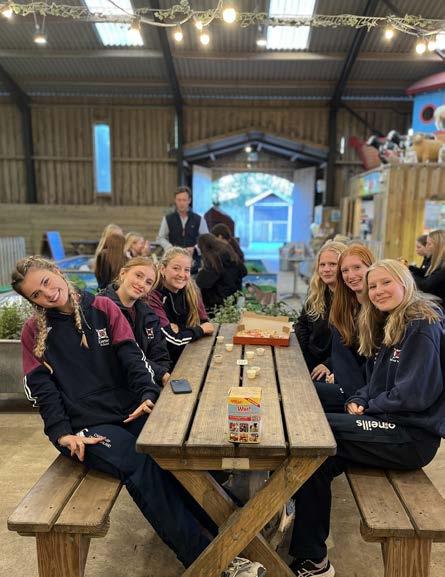
the school at public events. The sports leaders programme enables pupils to learn about the role of coaching and extend their knowledge in a range of sports (see page 45), while the Hospiscare Young Changemakers partnership provides a unique opportunity to develop people skills in a community healthcare setting. Sixth formers are also given the opportunity to qualify as lifeguards and put this skill into practice in the indoor pool. With our Young Entrepreneurs scheme, the challenge is to design and market innovative products; pupils set up and run a trading company for a year, developing their teamwork and problem-solving skills. In recent years, Exeter School teams have reached the Devon finals, winning best trade stand and best overall business, and have represented the county in the West of England round of the competition.
All these positions offer opportunities to learn more about leadership and management, and to develop important skills for later life: an ability to accept responsibility and carry out tasks reliably, to work as part of a team, to think and act independently of instruction or supervision, and to become confident in leading junior pupils and those from their peer group.
Exeter School runs biennial hockey and rugby tours, with the most recent being a hockey trip to the Netherlands in October 2025. Adventure expeditions happen every two years, with the 2025 destination being Kenya.
Music is thriving at Exeter School and pupils can perform regularly in Exeter Cathedral and local churches, as well as in the music department's recital hall. There is a full programme of annual musical events including the carol service, concerts in the spring, at Christmas, and in support of WaterAid, as well as the biennial Choral Society, whose members include senior pupils, staff, and families of pupils.
Sport plays an important role in the life of Exeter School. All pupils can immerse themselves in a wealth of recreational and competitive sport. The central aim is to develop an enthusiasm for physical activity in all pupils, while nurturing their independence, selfconfidence, leadership, and teamwork. As well as the major sports of rugby, hockey, football, netball, rounders, and cricket, other options include swimming, climbing, water polo, spin bikes, body conditioning, aerobic fitness, cross country, squash, basketball, golf, padel, and table tennis.




Members of the sixth form will need a suitable portable device at school to aid them with their studies and enable full participation in all lessons.
Portable devices support collaborative learning both in class but also remotely when completing tasks at home. They also promote innovation, creativity, and risk-taking to enhance learning in ways that were previously not possible, providing a more personalised learning experience.
The learning environment at Exeter School has moved rapidly in recent years to include more digital approaches. However, we still use books and paper, blending the best of the traditional with the new and innovative.
Portable devices are additional tools which will aid the development of high-level employability skills, a level of technical understanding that gives an awareness of current working practices, and an extra competitive edge when it comes to next steps.

PORTABLE DEVICE REQUIREMENTS
Devices brought into school must:
• H ave a screen size of at least 10 inches
• nclude a keyboard (either hardware, software or Bluetooth)
• Run the latest version of Microsoft Office which is available from school
• H ave built-in wi-fi and the ability to access the internet
• H ave a battery life of over five hours of regular use
The A Level and BTEC courses available are explained in this guide. You will find course information, entry requirements and methods of examination as well as ideas for future career paths.
An Exeter School programme allows all pupils to begin with four subjects in the Lower Sixth (Year 12), with one subject chosen from each of the columns below. By the start of the Upper Sixth (Year 13), most pupils continue with three subjects to the end of the course. Some will maintain four subjects, while others may decide earlier in the Lower Sixth to focus on three subjects for a variety of reasons.
Starting with four subjects is the strongly recommended approach for most pupils, as it provides breadth and flexibility. Many pupils change their minds about subject choices and possible university pathways during the Lower Sixth year. All pupils, whether studying three or four subjects, benefit from our Futures programme, including the opportunity to pursue an Extended Project Qualification (EPQ) – further details on these aspects of
our programme are found later in this booklet.
Alongside the option to move to three subjects during the year, some pupils may prefer to start with three subjects from the outset. Pupils who choose this route may do so for a variety of reasons: to devote more time to their EPQ; to focus on preparation for a competitive university application; to pursue an elite programme in sport, music, or drama alongside their academic studies; or to ensure they have the right level of support to achieve three strong grades in their chosen subjects. There will be an opportunity to indicate a preference to start on three subjects on the options form, which will then be discussed further. However, to assist with our planning and ensure that all pupils can follow their desired pathways, we ask all pupils initially to select four subjects.
Decisions about sixth form pathways are always made with the pupils’ best interests in mind. Pupils are encouraged to talk to members of the academic and pastoral teams to ensure that any decisions about their future are fully informed.
If your first choice of four subjects does not fit into the option columns, then it is worth checking and discussing with us whether the four subjects fit well together: do they combine to give you options going forward as well as supporting each other? The subjects labelled with an asterisk are more moveable than others and if your preferred choice does not currently fit in the columns below, it is essential that you include details of the subjects that you want to study on the options form (or email admissions@exeterschool.org. uk for external applicants). After the options form deadline, which is Thursday 5 February 2026 for existing Exeter School pupils, we will try to alter the columns to accommodate your choices. In the very rare case where this is not possible, we will provide a combination of subjects that is appropriate to your higher education or employment ambitions.
Advanced Level qualifications (known as A Levels) are subject-based qualifications that can lead to university, further study, training, or work. A Levels are linear qualifications which means you take all the exams at the end of the two-year course rather than being assessed after each module. For some subjects, part of the qualification is made up of nonexamined assessment – formerly known as coursework.
If you enjoy academic learning and want to study a broad range of subjects, A Levels would be the perfect option for you. A Levels are valued by universities and employers alike. Some universities require specific A Levels for certain courses, and they may not accept vocational qualifications.
WHAT ARE BTECS?
BTECs are qualifications that are generally more vocational, which means that they tend to be more applied and career orientated. As a BTEC pupil you

will put your learning into practice in real-life scenarios, by producing assignments, developing practical skills, and building knowledge.
In the sixth form at Exeter School, we offer the BTEC National Extended Certificate in sport, which is an academically rigorous qualification, equivalent to an A Level. This is a flexible option, so you can choose to study this BTEC alongside A Levels. Most universities (including more selective ones) accept BTECs as part of their typical degree course offers, alongside A Levels. However, you should investigate the entry criteria of any course you are interested in before committing to the qualification.
You can discuss your preferred subject choices and chat with teachers and heads of departments at our sixth form open evening on Thursday 6 November 2025 For our current pupils there is also the Upper Fifth parents’ evening towards the end of January 2026 where you can gain further advice from your subject teachers and head of year.
Prospective new pupils are always welcome to contact the admissions team (admissions@ exeterschool.org.uk) to arrange an individual meeting to
If you are a current pupil in the Upper Fifth at Exeter School, your parents should return your provisional options form to the school by 9am on Thursday 5 February 2026 via the online form on MySchoolPortal. New pupils joining the sixth form will be asked to complete their options form when applying for a place prior to their entrance interviews.
If you change your mind after the submission of your provisional options in February then you must see your head of year and the Deputy Head (Academic). New pupils joining the sixth form should contact the admissions team who will be able to offer help and advice.
discuss your study and subject options.
Making choices about which subjects to study is rarely easy. The factors to be considered when choosing subjects include the following:
• enthusiasm for further study of the subject
• ability previously shown in this or a related field
• intentions for higher and further education and future career choices
• suitability of the combination of subjects
• keeping future options open
Please read this booklet carefully and then ask for advice from your teachers, parents, head of year, heads of department and current sixth form pupils. In particular:
• discuss your suitability for subjects with teachers
• t alk to sixth formers studying those subjects
• a sk yourself what you like about the subject
• discuss your thoughts with your parents and head of year
• look beyond the sixth form to university and career possibilities. The UCAS website can be used to check that your options choices are suitable for certain university courses
Subject choices may also be modified, if necessary, once you see your GCSE results in August. All option choices are then finalised immediately before the start of the autumn term 2026. In the very rare case that a course is oversubscribed then the admission to such a course will be based on three principles:
• date of application – February requests will take precedence over August requests
• importance of the subject for a pupil’s subsequent career
• previous level of performance in related subjects – e.g. GCSE grades
It is important to note that courses listed in this prospectus are all expected to run in September 2026 but are dependent on a viable number of pupils for each course. If there is a particular course that you would like to study but that is not currently offered, then please get in touch with the Deputy Head (Academic) as soon as possible.
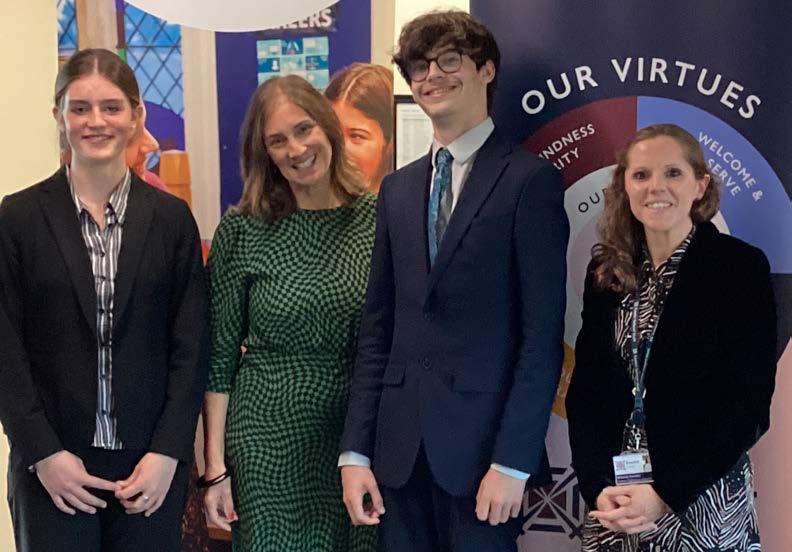
as producing a strong CV, interview skills, and giving presentations with confidence, as well as broader sessions on leadership and wellbeing.
Careers: this focuses on developing your understanding of the nature of the labour market and of different career options. It also includes specialist careers advice from those already working in their desired field. There is also tailored advice for pupils with very specific pathways in mind, as well as guidance for those who have very little idea of what they might like to do after Exeter School.
transferable skills are equally important.
INTERESTS:
• You should think about what careers you might find enjoyable and satisfying.
• Throughout your time in the sixth form, you can access the latest information on higher education in the school library and on the school SharePoint.
Alongside our core academic programme, we offer wide-ranging opportunities that focus on preparing you for your life beyond the sixth form, developing important skills you need to ensure your future options remain open. Our Futures programme of talks, workshops, and other activities takes place in a dedicated timetabled slot each week, with sessions focused on developing three key strands: employability, careers, and university.
Employability: this focuses on the development of the appropriate skills and values in preparation for the path you may wish to take in the future. This includes practical workshops such
University: you will receive guidance on researching course and university choices and develop your understanding of the UCAS application process. This includes our programme of support for pupils who wish to apply for highly selective courses and/ or universities: medicine, veterinary science, dentistry, Oxbridge, and other high tariff institutions.
As part of the Futures programme, there are several landmark events throughout the sixth form, including a careers convention, higher education forum and a Lower Sixth careers conference. You are also given the chance to experience a general interview with a professional outside the school, when every effort is made to match you to an interviewer with similar interests. This is a unique opportunity for you to practise interview techniques and improve your presentation skills.

Your combination of subjects will affect the range of courses open to you in higher education and there are a number of points to consider.
• Some careers demand a very high standard of qualification (e.g. veterinary science, medicine, law) so pupils should speak with their subject teachers and head of year about their chances of achieving the necessary A Level grades.
• Acceptance on some courses may depend upon having completed relevant work experience.
• For most pupils, gaining work insights is useful in deepening knowledge, building and developing skills, and to show commitment to a certain field. Try to think creatively about how to gain experience. Are there any online courses you could take advantage of, or a virtual event that will allow you to listen to key professionals working in a certain sector? How about listening to career podcasts or asking at school if there are any alumni that you could connect with?
All these ideas and more can deepen your knowledge of career opportunities.
• GCSE qualifications may be used by some universities as part of their selection criteria for making conditional offers.
• There are an increasing number of additional examinations required for entry into medicine, veterinary science, law, and maths at several universities including Oxford,
Cambridge and Imperial College. These are generally sat close to or during the October half term in the Upper Sixth year.
ABILITIES: You are encouraged to try and identify career paths that match your own abilities and skills. It is important to consider in which GCSE subjects you achieved well, but non-examined,
• Mrs Szender is the school’s Career Pathways Advisor and is keen to offer guidance and advice at any point during the year whether it is by email, phone or in person.
DEGREE LEVEL APPRENTICESHIPS:
Going to university will be the right choice for many of our pupils, but degree level apprenticeships are an alternative that should be considered. You would work for a company, gaining valuable experience whilst also completing a degree. Typically, your university fees are paid for by your employer, and you earn a salary at the same time.


system. You will belong to a house made up of approximately 140 pupils from the Third Form to the Upper Sixth, led by the head of house. Your year group is led by the head of year and overseen by Mr Chu, Assistant Head (Sixth Form). You will also have a sixth form tutor who will normally remain with you for both years, and be a key figure in your pastoral welfare and academic progress.
PASTORAL CARE
Our knowledge and understanding of all our pupils as individuals are key; we aim to develop your personal wellbeing and support you to achieve your very best. New pupils are welcomed warmly, and we support you as you settle into your new community.
There is a large and experienced team which focuses on your pastoral care. In our busy world, it is essential that you develop self-awareness which then leads to you taking a proactive approach to your own wellbeing.
The focus for pastoral care and academic guidance is our ‘tartan’ structure of year groups and the house
We firmly believe in working closely with our families, hosting events throughout the year which help to foster strong relationships. Pupils and parents are encouraged to attend as many parents’ evenings, school events, and social functions as possible. Parents are encouraged to keep in touch with your tutor and head of year regarding any personal or academic matters. Miss Dunning, Deputy Head (Pupil Development, Welfare and Wellbeing) and Mr Chu Assistant Head (Sixth Form) also contribute significantly to your pastoral care.
In addition to the individual support from your teachers, both in and out of your lessons, many departments also run a schedule of lunchtime support sessions that sixth form pupils can access if they wish. These offer opportunities for you to brush up on some basics, get some specialist support on a tricky topic, or engage in challenging extension material.

Entering Exeter School for your sixth form years is an exciting prospect. We are here to support you through the process.

The vast majority of Upper Fifth (Year 11) pupils at Exeter School continue into the sixth form and each year a significant number of new entrants join us from other schools. To qualify for entry into the Lower Sixth, applicants and current Upper Fifth pupils normally need to achieve a minimum of three grade 7 and three grade 6 GCSEs or have a points score of 39 from their top six subjects (a grade 9 = 9 points), as well as passing GCSE English and mathematics, and have a positive reference / school record (that includes conduct, attendance and punctuality).
Individual subject entry requirements are also detailed on the subject pages within this guide.
External applicants will be invited to one of our interview days, the first of which will be held on Saturday 29 November 2025 The day consists of:
• Interviews with the heads of departments of the subjects the applicant wishes to study. These are designed to discover an applicant’s motivation, future potential, and existing subject knowledge
• An interview with the Head and meeting with the Assistant Head (Sixth Form)
• Evaluation of a reference / school record provided by the candidate’s present school
• A computer-based cognitive abilities (CAT4) test
New entrants should inform the school of their GCSE results as soon as possible after GCSE results day in August 2026.
The school is normally unwilling to consider a situation whereby sixth form pupils live in accommodation independently of their families. Parents and pupils who wish to make such arrangements must first discuss their plans with the Head or Director of External Relations. The school works with Gabbitas Education to provide an educational guardianship service and homestay accommodation for any international pupils, or for sixth form pupils whose families do not live within commuting distance of the school.
Advice from our recent alumni.

LILYMAY G (2010-2021)
I took business, geography and English language for my A Levels, receiving an A, A, B. Outside of school, completed a diploma course in sporting excellence which helped me to solidify my spot at university.
‘My advice is to not worry too much about which A Levels you pick... Pick what you will enjoy, as you are spending the next two years doing it.’


While at school, I was involved in the first team for hockey as vice-captain, and first team netball. I was a member of both chamber choir and Belles Canto. Furthermore, was part of the CCF Army section and received an award when I finished school.
Additionally, I was honoured to have been selected as Head Girl.
In 2021, I was accepted to Durham University, where I studied BA sport exercise and physical activity. This past summer I graduated with a 2.1 which was very proud of. I chose to not take a gap year before university as my A Levels were during the pandemic and I felt I wanted to get stuck in straight after school.
TOM K (2012-2021)
For A Levels, I took maths, biology, chemistry, and Spanish because I enjoyed them and although I wanted to do medicine, I also wanted to keep my university options open.
Most of my extracurricular activities were sports related. I played rugby, hockey, and cricket for the school and played rugby outside of school. I attended MEDSOC events and volunteered at the RD&E to support my medical school application. Additionally, I was part of the Army CCF and held an RLSS lifeguard qualification, which allowed me to lifeguard at the school pool.
Unlike a lot of my friends, I went straight to university after finishing school, and I’m currently in my fourth year at Cardiff University studying
medicine. The majority of my time is taken up by course and rugby commitments, however, I am also currently on the Cardiff Anaesthetic, Perioperative and Intensive Care Society (CAPS) committee.
When choosing my A Levels, I wasn’t entirely sure about my career path. I enjoyed my work experience at the RD&E but had heard mixed opinions about a career in medicine. I chose subjects that would keep my options open. I kept returning to medicine and eventually realised it was the right choice, and I haven’t regretted it since.
Don’t stress if you’re unsure about your future plans. It’s important to avoid subjects you don’t like, and remember, there’s always a pathway to your chosen career.

‘Don’t stress if you’re unsure about your future plans. It’s important to avoid subjects you don’t like’
‘You don't need to have a fully planned out career path when you finish school as your interests can develop as opportunities emerge’
My advice is to not worry too much about which A Levels you pick. If you 100% know what degree you want to study and what career path you want to follow, and which A Levels you need to get you there, great. But if you are not sure, then DO NOT STRESS. Pick what you will enjoy, as you are spending the next two years doing it. As you can see, none of my A Levels related to the degree I chose, and like to think I turned out okay.
Good luck to all of the Upper Fifth who are about to choose A Levels.
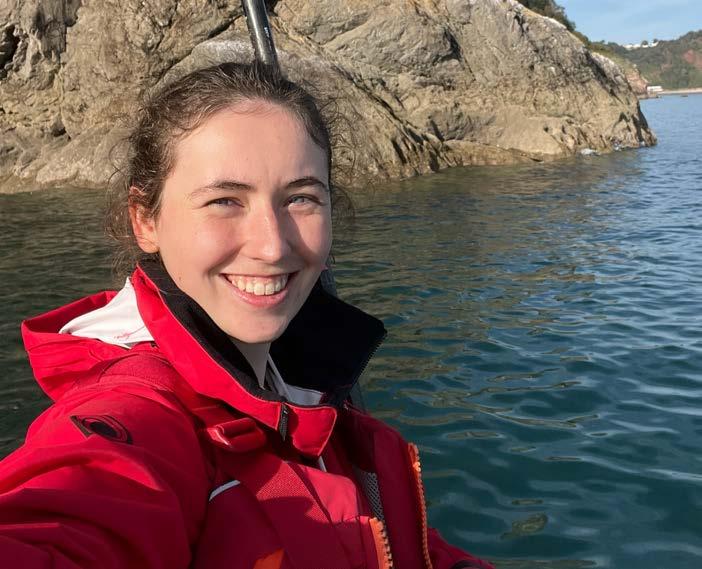
FREYA H (2013-2020)
After finishing my A Levels went to Durham University during the pandemic to study chemistry but really struggled with the lack of contact, which resulted in me dropping out after the first term. couldn't be more grateful now as it gave me the opportunity to re-evaluate what was
important to me, what enjoy, and how I work and learn best.
which has led me into the fascinating world of ready meals, lunchtime meal deals and savoury pastry. I've experienced three one-year placements, at two different sites, in process development, compliance and raw materials. I will finish my course in the next month with a degree and three years' industry experience.
I have secured my first role off the scheme at my current site as a senior process technologist. From there, I will look to progress into management or take the transferable skills I've learnt and pivot careers into residential property.
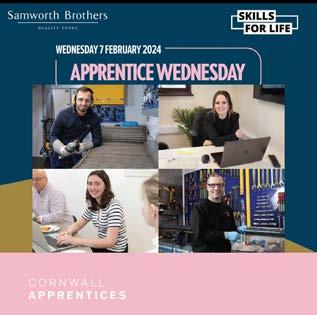
I applied and got a role as a degree apprentice studying food science for industry with Samworth Brothers,
You don't need to have a fully planned out career path when you finish school as your interests can develop as opportunities emerge. Be open minded and don't be scared to take a gap year instead of starting something just because it is what everyone else is doing.
‘My advice to you choosing your A Levels would be to imagine yourself in sixth form, walking into an A Level English class for instance. Now think how you would feel to be there. Excited and ready to learn?’

ALEX J (2016-2023)
I took English, French and Spanish at A Level. I’m a keen sportsman and I managed to get involved with rugby, hockey, cricket and even some rugby sevens during the sixth form. Outside of sport, I completed my Gold DofE and wrote for the Exonian magazine, which I would highly recommend. I left Exeter School in 2023 and decided to take a gap year before starting at Bristol University where I am now. During my gap year, spent 3 months in Madrid as an au pair, improving my Spanish and trying to live the Madrileño lifestyle to the fullest. then spent some time working for AO.com which although less enjoyable, was, upon reflection, equally as valuable an experience.
During my A Levels, I had very little idea of a career path that I might want to follow. But I did know I wanted to continue studying English and Spanish, which is what I am now doing at Bristol. Today, I still have very little idea of what my career might look like, but that isn’t something that worries me. As Oscar Wilde said, ‘if you know what you want to be, then you inevitably become it – that is your punishment, but if you never know, then you can be anything.’
My advice to you choosing your A Levels would be to imagine yourself in sixth form, walking into an A Level English class for instance. Now think how you would feel to be there. Excited and ready to learn? Or dragging your feet at the prospect of another two years of reading and essays? Or somewhere in between most likely. Do this for each subject and whichever four you feel most positively about are probably your four.

‘When choosing
your A
Levels, I would recommend you think about what really ‘floats your boat’, and what makes you want to learn more’

KAI J (2016-2022)
I took drama, economics, English literature and religious studies A Levels and participated in a wide range of activities from music societies like Swunk, symphony orchestra and chamber choir, as well as MUN and general knowledge. I also helped found the first pride society at Exeter School alongside my studies.
SARAH P (2010-2021)
I left school in 2021, having done A Levels in psychology, geography and politics. In the past three years, I have travelled and worked my way across the globe. I am currently a degree apprentice with the police, based in Bristol. This is a mixed degree involving on the job experience and then some study at the University of West England. This role has been one of the most challenging experiences of my life, but more rewarding than anything I have done before. My greatest bit of advice would be to look at your options, because you never know what’s out there.
My current career ambitions are to one day be a sergeant, and then specialise in roads policing, but I also want to teach someone who felt
‘No
matter what A Levels you do, they will not determine the path for your entire life. I have met many people in my year who in their mid to late twenties, either pursued a career in one direction before changing their mind, or are starting a new degree for the first or second time.’
In September 2024 started a BSc in politics, philosophy and economics, at the School of Oriental and African Studies (SOAS) in London. Living in London has opened so many opportunities for me to pursue my passions, but the vastness of it can be overwhelming at times. am currently the president of my university's philosophy society, as well as treasurer and welfare officer for the queer society. have also been campaigning a lot for international causes and attending student marches.
When choosing your A Levels, I would recommend you think about what really ‘floats your boat’, and what makes you want to learn more, makes you think about exploring this subject in later life, hence my choice to do psychology, and learn about the mind. It should be something you are passionate about, and something that strives to challenge what you may or may not already know.
My advice to you would be that you are young. No matter what A Levels you do, they will not determine the path for your entire life. I have met many people in my year who in their mid to late twenties, either pursued a career in one direction before changing their mind, or are starting a new degree for the first or second time. You do not have to get it right first time.
No matter which A Levels you take you will learn valuable analytical, linguistic and time management skills. Studying drama can make you a better lawyer; studying French a better chemist; studying maths a better fashion designer. If you have a career that you are set on, then go for it, but it is okay if at any point you are unsure.
And please always remember, no matter what you choose, look after yourself and your mental health, academics aren't everything. So, keep doing extracurricular activities, keep taking time away from studying to look after yourself, keep getting early nights and keep reminding yourself that the best you can do is enough. Hard work does pay off, but going hard on yourself does not. exactly how I did when I walked into my first police station. Part of our job is not only to do what it says on the tin, but looking out for others, and I have a real passion for that, I believe I have a real sense of understanding when it comes to people, and I want to use that to help others.

OVERVIEW You will follow the AQA art, craft and design syllabus, which allows you to explore many different aspects of the subject. The course is designed to build on the skills, knowledge and understanding introduced at GCSE and you are required to develop practical work supported by critical/contextual studies in one or more of the following disciplines: drawing, painting, mixed-media, sculpture, installation, printmaking, moving image (video, film, animation) and photography.
COURSE OUTLINE
In the first year of the course, you will be introduced to a variety of experiences, employing a range of media, processes and techniques appropriate to your area of individual study. Your knowledge of art will be extended through contextual research, experimentation with materials, development of ideas and the realisation of final outcomes. Great emphasis is placed on the individuality of approach and the willingness to take risks with techniques and concepts.
Recording from direct experience is an essential part of the course.
The second year of the course is divided into two key areas:
1. Personal investigation (60% of A Level)
A personal investigation in which you develop practical work in response to an idea, issue, concept or theme of your choice. The practical work is supported by a personal study of 1,000 – 3,000 words.
(No time limit)
2. E xternally set assignment (40% of A Level)
An externally set assignment based on eight starting points from which you will select one. You will work on preparatory studies before producing a conclusive personal response in the supervised time.
(Supervised time: 15 hours)
METHOD OF EXAMINATION Both the personal investigation unit and the externally set assignment are assessed internallyby departmental staff and then moderated by a visiting examiner from AQA.
ENTRY REQUIREMENTS A minimum GCSE art grade 6 is strongly recommended. You should have an enquiring mind, be highly motivated, and are expected to be an organised, self-disciplined, independent thinker.
EXAM BOARD AND ENTRY
NEXT STEPS
AQA
A Level Art and Design – Art, Craft and Design 7201/C/X
The subject develops pupils’ imagination, creative involvement and aesthetic sensibilities and prepares them well for a foundation art course and degree courses in art, design or architecture. Professions involving art and design are wide ranging including: fine art, architecture, theatre design, fashion, graphic design, illustration, animation and publishing.
CONTACT Mrs Jen Brewer, Head of Art jlb@exeterschool.org.uk
OVERVIEW
COURSE OUTLINE
This course provides a foundation in fundamental biological principles whilst exploring modern applications of biology. The topic areas studied in the sixth form build upon and extend the material covered in IGCSE biology, with answers to ‘why?’ and ‘how?’ molecules, cells and organisms interact. In addition to exploring the traditional areas of biology, you will also gain an up-to-date insight into technological, social, ethical, and environmental implications of the subject.
We encourage pupils to take an active role in the lessons, from contributions to discussion, to group tasks and pupil modelling. Theory lessons are supported by many relevant practical investigations and activities. At the start of the second year, we run a fieldwork residential to FSC Nettlecombe in Somerset.
The first four topics, taught in the Lower Sixth cover many fundamental principles, which are built upon and used in context in the last four topics in the Upper Sixth year.
1. Biological molecules – Investigates the properties of carbohydrates, lipids, nucleic acids, and proteins and understands the roles these essential molecules play within organisms.
2. Cells – From the basics of cell ultrastructure, we explore ways in which substances move into and out of cells, how cells divide and cellular interactions of the immune system.
3. The exchange of substances between organisms and their environment – Studies digestion and absorption, the specialised gas exchange surfaces of gills, insect tracheae, lungs and leaves and concludes with studying the circulatory system and plant transport.
4. Genetic information, variation, and relationships between organisms – Explores the importance of the genetic code and causes of variation and diversity.
5. Energ y transfer in and between organisms – Covers the biochemistry of photosynthesis and respiration and links them to energy transfers between organisms.
6. Organisms respond to changes in their internal and external environments – Delves into the world of stimuli and receptors, nervous coordination, muscle contraction and hormones.
7. Genetics populations, evolution, and ecosystems - Introduces fieldwork techniques to study population ecology, then continues with genetic inheritance and evolution.
8. DNA technolog y and control of gene expression – Discovers what controls whether, and when, genes are expressed, then explores techniques and ethics of gene technology such as genetic engineering and DNA fingerprinting.
METHOD OF EXAMINATION
ENTRY REQUIREMENTS
BOARD AND ENTRY
NEXT STEPS
CONTACT
There are three examination papers at the end of the second year. Papers one and two test content and practical skills from topics taught in the first and second years respectively. Paper three tests the full course material, with questions of a synoptic nature and an essay.
There is also a teacher-assessed practical endorsement based on pupils completing a minimum of 12 core practicals undertaken throughout the course.
Minimum GCSE biology grade 6 (with similar chemistry grade) or 6, 6 in dual award science.
Grade 6 or higher in GCSE maths is strongly recommended. An ability to learn key terms and apply knowledge to new contexts is essential for success in the exams.
A Level Biology 7402
Mrs Julia Metcalf, Head of Biology jhm@exeterschool.org.uk AQA
A broad range of career areas are open to graduates in biological sciences: agriculture, biotechnology, biochemistry, cell biology, data science, dentistry, ecology and conservation, forestry, genetics, horticulture, marine biology, medicine, nutrition, pharmacy, physiotherapy, psychology, veterinary science, zoology. Biology also keeps the door firmly open for more general careers in teaching, business and finance.
OVERVIEW Business A Level provides a comprehensive investigation into the business world, determining the purpose of businesses and how they make decisions. It provides an insight into a range of diverse topics from marketing and human resources through to finance and the legal structures of businesses. You will also look at the different strategies that businesses adopt to survive in highly competitive and constantly changing markets.
COURSE OUTLINE In the Lower Sixth, you are given a preliminary insight into the major functional areas of a business. This will include marketing, which looks at how firms successfully market their products and position themselves, and operations management, which investigates how businesses organise their production lines and measure quality control. You will also learn some of the management techniques used by businesses and critically assess the leadership styles employed by various firms. Financial concepts are also covered here, and pupils will be able to investigate common financial problems encountered by firms such as cash-flow problems and issues around raising capital for start-up businesses and PLCs alike.
In the Upper Sixth, you will build upon the work covered before and look at how firms operate strategically to survive and grow. You will learn how firms are affected by the macroeconomic environment and how firms must adapt to changes brought on by political, economic, technological, and social changes. Using various case-studies you will come to understand some of the success stories from the corporate world and some of the failures. Finally, looking to the future, you will assess the impact of innovation, internationalisation, and digital technology on firms.
METHOD OF EXAMINATION Three two-hour written examinations, assessing the work from both the Lower Sixth and Upper Sixth years. The papers will contain a mixture of multiple choice, short and long answer questions. All the papers will assess relevant knowledge and skills as all papers are synoptic. Paper three is based on a single case study where pupils are expected to view businesses holistically, answering long essay style questions.
ENTRY REQUIREMENTS No previous qualification in business is required for the A Level course, and you are expected to have at least GCSE grade 6 in maths and English language.
EXAM BOARD AND ENTRY
NEXT STEPS
CONTACT
AQA
A Level Business 7132
Most pupils who study business at A Level go on to study business or a related course at university and there are a wide range of courses available. Although not essential, business can be seen as a gateway to courses as diverse as finance and management, marketing, accountancy, international business and strategic management.
Mr Stuart Mackintosh, Head of Business skm@exeterschool.org.uk
OVERVIEW Chemistry is central to the study of modern science because it is the only subject which provides knowledge of the structure of substances, an understanding of the ways in which particles behave and interact and how these are translated into observations in our macroscopic world.
The units covered in the sixth form build upon the material covered in GCSE chemistry dividing the subject into its three traditional areas of inorganic, organic and physical chemistry. The work in the Lower Sixth year covers the fundamental principles of these three areas, with the Upper Sixth work then building and expanding on them. Experimentation, practical skills, and data handling skills form an integral part of the course.
COURSE OUTLINE The main topics within the course are:
1. Inorganic chemistry
The chemicals of the periodic table are the focus of the inorganic chemistry. Chemical trends are studied in the Lower Sixth, with particular focus on group II and group VII. In the Upper Sixth, the varied chemistry of transition metals, their structures and their complexes form a large part of the course. Periodicity and the patterns across the periodic table helps to link both years.
2. Organic chemistry
This unit illustrates the importance of carbon compounds. In the Lower Sixth, we delve deeper into the chemistry of many of the compounds already studied at GCSE, such as alkanes and alkenes, alcohols and halogenoalkanes. In the Upper Sixth, further functional groups such as carbonyls, aromatic compounds and amines are studied linking to organic synthesis pathways. A brief introduction to biochemical compounds, with modern analytical techniques such as NMR spectroscopy and chromatography make up the remainder of the unit.
3. Physical chemistry
Among the familiar GCSE topics expanded upon here are atomic structure, amounts of substance, chemical bonding, energy changes, redox reactions, reversible reactions and the periodic table. In the Upper Sixth, a more quantitative approach is taken to gaseous equilibria, kinetics and energy changes. Acids, bases, buffers and pH are also studied, along with thermodynamics.
METHOD OF EXAMINATION
ENTRY REQUIREMENTS
NEXT STEPS
CONTACT
Three two-hour written examinations, assessing the work from both years. The papers contain a mixture of multiple choice, short and long answer questions. They also assess practical skills with the final paper containing further questions on practical techniques and data analysis. In addition, there will also be a teacher-assessed practical endorsement based on pupils completing 12 core practicals alongside many others undertaken throughout the course.
Minimum GCSE chemistry grade 6 or GCSE double award science grades 6,6; although grade 7 is strongly recommended. GCSE mathematics grade 6 or above is also recommended.
AQA A Level Chemistry 7405
University course admission: chemistry is essential for all courses in chemistry, medicine, dentistry, biochemistry, materials science, pharmacy and chemical engineering.
Career information: Although many chemistry graduates work in industries involved with a range of materials such as oil, pharmaceuticals and processed food, just as many find the skills they have developed allow them to embark on a range of careers such as accountancy, marketing, banking and the legal profession.
Dr Simon Smale, Head of Chemistry sps@exeterschool.org.uk
OVERVIEW Classical civilisation is a subject which allows pupils to explore the cultures of ancient Greece and Rome without needing to read the original languages. It explores the literature, art and ideologies of those societies and places them into their social and historical contexts, making this subject a superb complement to other humanities A Levels, such as English or history. There is no need to have studied a classical subject previously and there is no linguistic component; pupils without any classical background have historically done very well at Exeter. Alongside our classroom activities, pupils may also have opportunities to watch translations of classical plays in performance, and a biennial trip to the Mediterranean will next be offered in 2026.
COURSE OUTLINE The A Level course consists of three components: the World of the Hero, Culture and the arts, and Beliefs and ideas. Each paper explores the ancient world both through translated literature and visual sources, such as statues and pottery. The World of the Hero paper is taught over two years, while the other two papers are taught in succession.
1. World of the Hero (40%)
In this paper you will study Homer’s Iliad and Virgil’s Aeneid, epic poems which explore the war between the Greeks and the Trojans and its aftermath. We study these foundational works of European literature both for their intrinsic interest and to better understand the values and ideologies of the cultures that produced them.
2. Culture and the arts (30%)
This paper looks at an aspect of the literary and artistic worlds of the ancients; typically, we study Greek drama, giving pupils the opportunity to explore the origins of tragedy and comedy in classical Athens. Through these texts we also explore the thinking of Aristotle and Athenian democratic culture. (Other options are available here, such as Greek depictions of the Persians, or early Roman imperial propaganda; the topic chosen will depend on the teacher).
3. Beliefs and ideas (30%)
This paper seeks to understand the underpinning beliefs that animated Greek and Roman society, and how they impacted on the history of Greece and Rome. Currently we explore the collapse of the Roman Republic, focusing in particular on the evidence provided to us by Cicero. (Again, other modules may be offered, depending on the teacher. Alternatives include Greek Religion and Athenian Democracy.)
METHOD OF EXAMINATION Assessment is by examination. All papers are a mixture of shorter responses focused onevidence, either from a written source or a visual one, and longer essays.
ENTRY REQUIREMENTS
Pupils are expected to have achieved a minimum of grade 6 in English literature GCSE. There are no further formal requirements, although an interest in literature and history is essential.
There is no need to have studied Latin, Greek or Classical civilisation at GCSE, and there is no linguistic component to the course.
OVERVIEW
This subject will develop pupils’ understanding of the principles of problem-solving using computers. There is an emphasis on programming at A Level and scope for pupils to show their individuality in their programming projects. The syllabus is split largely into theory and programming lessons, with the main programming language being C#.
Resources are shared electronically and most work is completed on PCs or laptops. Lesson time is mainly spent answering questions to develop understanding of theory concepts or creating programs to explore programming concepts. Homework tasks can be either theory work or programming, and the Wolfson suite facilities are available to pupils who want to work in between lessons. There are also many extra-curricular opportunities with competitions such as Bebras, National Cipher Challenge, ACE Cybersecurity, CodinGame and the British Informatics Olympiad. We also enjoy inviting alumni back to talk about their experience in computing.
1. Paper 1 – problem solving and programming
This paper examines computational thinking skills, programming and applying theoretical concepts to problem-solving situations. Topics include programming constructs, data structures, standard algorithms, and regular languages. Part of the paper relates to a “skeleton” program provided by the exam board which we will study, adapt, and extend in lessons.
2. Paper 2 – theory
This paper tests knowledge and understanding of theoretical aspects of the course and considers the impact of cutting-edge developments in computing. Topics include how the hardware and software components of a computer system work together to execute a program, how data is transmitted over networks and the internet, and how binary can represent different types of data and programs in a computer. The syllabus also features sections on relational databases and functional programming. The question formats are predominantly short answer with some multiple choice and some extended answer questions.
3. Non- exam assessment – a computing practical project
The NEA assesses your ability to create a program to solve a practical problem or investigation of your own choice. You must also document the analysis, design, testing and evaluation of the solution. Typical choices of problems include games, simulations, databases, or interactive websites although the range of choices is extensive.
METHOD OF EXAMINATION Paper one is a 2 ½ hour on-screen examination, contributing 40% of the overall grade. Paper two is a 2 ½ hour written examination, contributing 40% of the overall grade. The non-exam assessment contributes 20% of the overall grade, based on the project documentation, the code bank itself, and the testing videos.
EXAM BOARD AND ENTRY
NEXT STEPS
A Level classical civilisation is an excellent preparation for various degree courses in classics or affiliated subjects such as ancient history or archaeology. It is also particularly useful for pupils who wish to pursue literature courses in either English or modern European languages, as the influence of the texts studied is profound. The mixture of cultural criticism and literary analysis, examined through commentaries and essays is also an excellent preparation for law and the humanities at university. Classicists have a well-earned reputation as accurate and independent thinkers, leading them to a wide variety of later careers, including in politics, the media, and the civil service, to name but a few.
CONTACT Mr Harry Drew, Head of Classics hmsd@exeterschool.org.uk
NEXT STEPS
Numeracy is required at several points in the course and A Level mathematics is recommended although not required. GCSE computer science is helpful but not a requirement; for those who have studied it, achieving grade 7 or above would maximise the likelihood of achieving well at A Level. Previous programming experience is required although the language studied is not important; a willingness to practise programming in your own time is essential.
AQA
A Level Computer Science 7517
University course admission: a qualification in computer science combines well with many subjects especially those involving a logical and systematic approach. Programming skills are important in all scientific, engineering, and mathematical disciplines as well as increasingly in the creative arts. Although rarely listed as a pre-requisite, having studied A Level offers an advantage as an introduction to some of the first-year material.
Degree level apprenticeships: several high-profile organisations now offer degree level apprenticeships in computing and cyber security disciplines.
CONTACT Ms Alice Pinches, Head of Computer Science aop@exeterschool.org.uk
OVERVIEW
COURSE OUTLINE
Drama and theatre studies is challenging in its requirement for you to have both practical skills and the ability to write analytically and originally in a formal written exam. This is one of only a few truly creative courses. It promotes communication, collaborative learning and problem solving; fostering creativity as well as personal and social development. It is a well-balanced course, encouraging academic rigour in the study and analysis of texts, and creativity in putting theory into practice via performance or technical design. Each week the lessons are split between lessons attributed to practical based performance and exploration of practitioners (such as Brecht, Stanislavski, Lecoq, Frantic Assembly, Complicite and Berkoff) as well as primarily desk based lessons that prepare you for the set texts (Blood Wedding, Company and The Book of Dust: La Belle Sauvage) for the written exam.
In the Lower Sixth, you participate in several practitioner workshops before going on and completing component one of the course (the ‘re-interpretation’). You will also study one of the set texts in this year. In the Upper Sixth, you will complete component two by the middle of the spring term. Alongside your practical work for component two, you continue your preparation for the component three written exam by studying the second set text and the specified extract dictated by the exam board of The Book of Dust: La Belle Sauvage. Regular trips to watch live theatre is part of the course. We would expect you to attend arranged theatre trips, as it is a course requirement that you must include live theatre influence in all your written work.
OVERVIEW
METHOD OF EXAMINATION
ENTRY REQUIREMENTS
EXAM BOARD AND ENTRY
NEXT STEPS
The A Level drama and theatre studies course is assessed by examination of either performance skills or design skills, as well as through a written exam. Weighting for assessment is 60% practical and 40% written exam.
In component one (internally assessed), you use the theories and ideas of a theatre company or practitioner to re-imagine an extract from a choice of plays. This is then realised in performance as either an actor or a designer (lighting, sound, stage design or costume) and supported by an essay that documents your development process.
In component two (externally examined), you perform two pieces. The first is an original piece of theatre inspired by one of four stimuli from the exam board where you must use the theories of a practitioner or theatre company to inform your ideas. The second is an extract from an existing script in a contrasting style to your devised piece. If you are a designer, then you participate in these two pieces from a technical perspective and then give a five-to-ten-minute presentation to the visiting examiner explaining your ideas. Both performers and designers then produce a report that evaluates the performances.
In component three (2½ hour written exam), you answer questions on three set texts from the perspective of an actor, a director, and a designer.
There is no stereotypical pupil of drama and theatre studies. A GCSE in drama is not required, although it is beneficial. However, an interest in theatre, an imagination, a readiness to engage in independent research and an enthusiasm to work with others are all essential qualities.
Eduqas
A Level Drama and Theatre
A690QS
The skills acquired in this course will equip you for a multitude of careers, as well as teach you a wide range of skills beneficial to life in general. The skills that the world economic forum identified as the most desirable among employers, are cultivated in drama (communication, problem solving, teamwork and cognitive thinking) – skills that A.I. and the automation of tasks cannot replace. Pupils have gone on to all the major universities, including Oxford and Cambridge, following courses across the academic disciplines. There have also been successful applicants to all the major drama schools. Post university, many have made successful careers in theatre, television, cinema, advertising, marketing and social media.
CONTACT Mr Jamie Brough, Head of Drama jsb@exeterschool.org.uk
Potential industrial designers and those interested in other specialist design disciplines should consider this course as a fundamental ingredient in their skill set.
The combination of in-depth material, process and construction knowledge, combined with innovatively solving real world problems through design, prototyping and testing, create well rounded pupils capable of delivering realistic products for manufacture. Engineers with both practical skills and theory knowledge are most sought after.
In class, you will develop a knowledge and understanding of a wide range of materials and processes used in the field of design, technology, and engineering. Industrial and commercial practices, quality control systems, health and safety, environmental factors, design history, legislation, digital technologies and information handling are all studied. This knowledge informs coursework decisions and is tested through the written examination of 2½ hour duration, and accounting for 50% of the qualification.
Component two: Independent design and make project
In this unit, you are given the opportunity to develop your creative, technical, and practical skills through a design and make project. The project must have a commercial viability and is developed with the support of a client. You will demonstrate creativity and flair by designing, making, and evaluating a prototype. Industry standard skills using Autodesk Inventor and Fusion 360 3D computer-aided design, and rapid prototyping techniques including laser cutting and 3D printing will be taught and used in coursework. You will also be supported to perfect skills of design sketching and innovative problem solving.
METHOD OF EXAMINATION
ENTRY REQUIREMENTS
A 2½ hour exam tests your knowledge of component one, through both short and long written answers, mathematical questioning and graphical diagrams, accounting for 50% of the qualification.
A coursework piece is completed, that demonstrates an iterative approach to a design opportunity and is supported by close liaison with a client or user group. This accounts for the remaining 50% of the qualification.
A grade 6 at GCSE in a design technology related course, and good quality graphic communication skills and an aptitude in design technology is desirable. You should have the ability to analyse products and apply knowledge to real situations. Coursework will require ability to work independently and to look at problems with an open mind. Organisation, time management and a good work ethic are also vital.
Edexcel
A Level Design Technology: Product Design 9DT0
NEXT STEPS
CONTACT
Design technology is one of the broadest subjects and thus it has a wide range of future university, apprenticeship, and career opportunities. These include academic courses associated with manufacturing industries, engineering, product design, project management and architecture.
Mr Alex Collard, Head of Design Technology ac@exeterschool.org.uk
OVERVIEW Economics studies the logic of the choices we make as a society. We start at the elementary level of consumers buying goods and services and go on to develop an understanding of how and why governments choose between different national objectives. We will look at a range of issues from trying to understand why some economies are not developing as rapidly as others, to looking at how individual consumers behave in the exciting new field of behavioural economics. The course will give you a thorough grounding in economic ideas and an understanding of what makes the economic system tick.
COURSE OUTLINE
The A Level course is divided into two distinct areas:
1. Microeconomics
This looks at the operation of individual markets and provides an insight into how markets work. In the Lower Sixth, you will investigate a range of markets, from commodity markets (including the oil market) to currency markets. You will also look at market failure, where government intervention is required to maximise the welfare of society. Markets studied include the education markets, transport markets and the drugs market. In the Upper Sixth, you will investigate market structures, looking at how monopolies and oligopolies operate and how the government intervenes in these markets to ensure they operate efficiently.
2. Macroeconomics
This area of the course looks at how the British economy works and how the government intervenes to try and influence key national indicators. You will assess economic performance by looking at inflation, unemployment, trade and economic growth and consider monetary and fiscal policy goals. In the Upper Sixth, you look at the international environment, looking at the global financial markets and international institutions such as the IMF, World Bank and WTO. You will also be expected to critically assess the economic impact of global events and logically deduce consequences.
METHOD OF EXAMINATION Three two-hour written examinations, assessing the work from both years. The papers will contain a mixture of multiple choice, short and long answer questions. Paper one is based on microeconomics and paper two is based on macroeconomics. Paper three is a synoptic paper which draws on both microeconomic and macroeconomic topics.
ENTRY REQUIREMENTS
EXAM BOARD AND ENTRY
NEXT STEPS
No previous study of economics is required to study the A Level course, although an interest in current affairs is expected. A minimum GCSE grade 6 in mathematics and English language is required.
CONTACT Mr Stuart Mackintosh, Head of Economics skm@exeterschool.org.uk AQA A Level Economics 7136
Although you do not need to study A Level mathematics to study A Level economics, many university courses require A Level mathematics. Those considering economics at Cambridge and the LSE are advised to take further mathematics.
OVERVIEW
COURSE OUTLINE
Just look around you – electronics are everywhere! Electronics specialists are in demand. In the A Level electronics course, you will learn about the basic principles and building-blocks of electronic systems and how to use these basic ideas to design and build more complex systems. There is a lot of practical work. Almost every circuit and system that we describe in theory is then built and tested by pupils. The culmination of the course is a major individual project, in which you design, build and test an electronic system to your own design and specification.
The starting point of the course is a careful review of circuit theory from GCSE physics. The course covers both digital and analogue electronics, including programming digital microcontrollers. The exam board provides an excellent set of dedicated notes that complement the work we do in class. The course is split into three sections:
1. Core concepts
System synthesis, DC electrical circuits, input and output sub-systems, energy and power: in DC and AC circuits.
2. Component one
• Semiconductor components
• Logic systems
• Operational amplifiers
• Signal conversion
• AC circuits and passive filters
• Communications systems
• Wireless transmission
• Instrumentation systems
3. Component two
• Timing circuits
• Sequential logic systems
• Programming of microcontrollers
• Digital communications
• Optical communication
• Mains power supply systems
• High power switching systems|
• Audio systems
METHOD OF EXAMINATION
40%: Principles of electronics, 2 hour 45-minute written examination.
40%: Application of electronics, 2 hour 45-minute written examination.
20%: Non-examination assessment comprising two practical tasks that are to design and program a microcontroller system and to design and build a substantial integrated electronic system.
ENTRY REQUIREMENTS
EXAM BOARD AND ENTRY
NEXT STEPS
Mathematics and physics (combined science) at a minimum of GCSE grade 6. No prior electronics knowledge is required.
Eduqas
A Level Electronics
A490
In recent years, many of the pupils have enjoyed the subject so much that it has influenced their choice of degree, and they have gone on to study electronics engineering at university. We also have pupils head on to a wide range of different degree courses at top universities, including subjects such as music, sound technology, economics and sports management.
CONTACT Mr Mark Schramm, Head of Electronics mes@exeterschool.org.uk
OVERVIEW English literature involves exploring some of the most influential poems, novels and plays that have shaped, and continue to shape, the world we live in. If you are interested in the big ideas which have forged who we are as thinking individuals and have an ear for language and the way words create music and light, then English literature is the subject for you. Over two years, you will hone your critical thinking and close reading skills, and your ability to analyse and argue in speech and in writing. You will become a better thinker, a better communicator and a better writer. English literature is a stimulating, well-respected (and facilitating) university subject and is essential for several important careers such as law, media, the performing arts and business.
COURSE OUTLINE
METHOD OF EXAMINATION
In the Lower Sixth, you will study an exciting range of modern poetry as well as two prose texts: Frankenstein and The War of the Worlds. In addition, you will explore one modern play: A Streetcar Named Desire Tennessee Williams’ classic tale of the American Deep South. You will also start working on your coursework texts: F Scott Fitzgerald’s The Great Gatsby and a text of your choice.
In the Upper Sixth, you will study Hamlet arguably Shakespeare’s finest play, as well as an anthology of poetry from the modernist period – with featuring poets such as Robert Frost, T S Eliot and E E Cummings. You will also complete a piece of comparative coursework (NEA, which is started in the Lower Sixth) allowing you to expand your knowledge of texts and apply a critical lens to your reading.
In addition to the texts studied as part of the course, the English department also encourages wider reading through lunchtime discussion groups. The aim is to cover a range of texts – from medieval to modern day – in an informal setting to inspire pupils to extend their reading and their love of literature.
Most components of the course are externally assessed (three examinations worth 80% of the total mark), as follows:
Paper 1: Drama (Hamlet and Streetcar)
Paper 2: Prose (The War of The Worlds and Frankenstein)
Paper 3: Poetry (modernism and a question on taught and unseen poetry)
There is also the NEA (worth 20% of the total marks), which comprises of a comparative essay on two texts that is between 2,500 and 3,000 words.
OVERVIEW The Pearson Edexcel Level 3 Extended Project allows pupils to study a topic area which extends their learning in an area of study, as a standalone qualification. Learners devise an analytical dissertation question which expands their learning in their field of study, in a related area, or in an area that is relevant to their own personal interests. The EPQ is offered as a dissertation and takes place in part through the Futures programme. Pupils are provided with taught sessions designed to develop research skills and referencing conventions. Group seminars and individual feedback sessions punctuate the programme at pivotal points, although the essence of the programme is to provide a framework for independent research.
In the second half of the Lower Sixth year, pupils may choose to focus on their three A levels alongside their Extended Project Qualification (EPQ). This structure enables them to dedicate more time to in-depth study and research, consolidating their academic strengths while developing the independent learning and critical thinking skills that universities and employers value highly.
Those who complete this qualification find themselves very well-equipped for the demands of undergraduate life having finished their own academic research presented in a format that conforms to the conventions required in academia.
ENTRY REQUIREMENTS
EXAM BOARD AND ENTRY
NEXT STEPS
You are likely to have achieved at least a GCSE grade 6 in English language and literature. More importantly, you should take pleasure in reading, the discussion of ideas and the art of writing.
Edexcel A Level English Literature 9ETO
Opportunities will be provided for those pupils interested in reading English at university and specialist Oxbridge tuition is available. The department has a strong record of acceptance at Oxbridge and Russell Group universities.
CONTACT Miss Jennifer Wilson, Head of English jaw@exeterschool.org.uk
COURSE OUTLINE
Pupils will be assessed on their ability to plan, manage, complete, and review their project. It is completed between October in the Lower Sixth through to December in Upper Sixth. You will complete a project proposal form, project log, your dissertation and a ten-minute presentation to an invited audience over that 15-month period.
METHOD OF EXAMINATION It is assessed by supervisor-assessors from within Exeter School and externally moderated by the exam board. An EPQ is worth half an A Level. The final dissertation is typically between 5,000 and 6,000 words in length.
ENTRY REQUIREMENTS
EXAM BOARD AND ENTRY
NEXT STEPS
CONTACT
None specified.
Edexcel
Extended Project Level 3 P301
An EPQ qualification can be used by some universities to adjust UCAS offers. For example, a UCAS offer of AAB could be adjusted to ABB with an A in an EPQ. Many universities, including highly selective ones, recognise the EPQ as an indication of academic engagement beyond A Level courses. Reference to an EPQ in a UCAS personal statement can provide a useful point of discussion (including at any interviews) and improve prospects of degree outcomes.
Mr Luigi Chu, Assistant Head (Sixth Form) lc@exeterschool.org.uk
OVERVIEW Geography occupies a central position in understanding and interpreting issues affecting people, places and environments across a range of spatial and temporal scales. As a multi-disciplinary subject, it presents you with the contextual knowledge and understanding of the big global problems we face today and equips you with the analytical and evaluative skills needed to manage these effectively. You will investigate the principal meteorological, hydrological and geomorphological processes operating in the physical world as well as the social, demographic, economic and political systems in place in the human world. A Level geographers are logical and analytical thinkers. They possess the skills to present ordered and coherent arguments in a variety of ways with the aim of solving human and environmental issues.
The geography department has a good programme of fieldwork, which usually includes an optional overseas field trip. Recent locations have included Interlaken, Sorrento, Iceland and Sicily. There will also be two local fieldwork day trips as part of the course.
OVERVIEW
COURSE OUTLINE
COURSE OUTLINE
The course follows an even split of human and physical topics across both years:
1. Core physical geography
You will study topics on hydrology and fluvial geomorphology, atmospheric processes and weather, and tectonic and slopes processes and weathering. Links are made to the human impact and ways of managing issues.
2. Core human geography
You will study the dynamic nature of how populations evolve in structure and the issues this poses, the different types of migration and reasons for this, and the changing structure of rural and urban settlements.
3. Advanced physical geography
You will study hazardous environments and hot arid and semi-arid environments, building on your knowledge and understanding of the Lower Sixth course. The sustainable management of these environments is assessed and evaluated by considering the interactions between human and physical processes.
4. Advanced human geography
You will investigate the decision made in managing sustainable energy supplies as well as the environmental impacts that different energy strategies have. Environmental degradation looks at the nature, causes and solutions to pollution issues as well as the protection of environments at risk at local and regional scales. Global interdependence involves trade flows and patterns, international debt and aid and tourism.
METHOD OF EXAMINATION
Exeter School offers a modern history course that attempts to strike a balance between British, European and world history. The overarching theme (and course title) is: ‘The Development and Erosion of Democracy 1800-2000’. Building on knowledge and skills learnt at GCSE the course develops a greater understanding of the modern world, not least key themes such as imperialism, nationalism, capitalism and communism. Important skills in the handling and evaluation of historical source material are developed to enhance your critical reading and understanding of the past.
The topic 'In search of the American Dream: the USA, c1917-96' comprises a study in breadth, in which you will learn about the dramatic political, economic and social transformation of the USA in the twentieth century, an era that saw the USA challenged by issues at home and its involvement in international conflict. There is also an in-depth study of what impact the Reagan presidency had on the USA in the years 1981-96.
The topic ‘India, c1914–48: the road to independence, comprises an in-depth study of the transition of the Indian sub-continent from a colony to independence and the subsequent influence on both the nature of civil rights campaigning and the search for national self-determination throughout the world. You will gain an understanding of the changing relationship between Britain and India during this period and of the reasons for this.
The topic ‘Ireland and the Union, c1774-1923, explores the Irish struggle for constitutional change, the ways in which the Irish economy and society evolved and their impact on mainland Britain. This was a difficult period in the development of Irish society and for Anglo-Irish relations, involving passion, tensions and commitment to different causes that were in many ways irreconcilable.
The non-examination assessment on ‘Hitler’s Germany 1933-45, is a single extended essay (maximum 4,000 words) that allows you to examine issues of historical interpretation and historiography. The work of three historians will be used to debate a key issue, such as ‘How powerful a dictator was Hitler?’ or ‘How popular were the Nazis?’
There are three external examination papers worth 80% of the overall marks:
Paper one: USA 1917-96 (2 hours and 15 minutes)
Paper two: India 1914-48 (1 hour and 30 minutes)
Paper three: Ireland 1774-1923 (2 hours and 15 minutes)
There is one coursework element on Nazi Germany marked internally and then externally moderated, worth 20% of the overall marks.
METHOD OF EXAMINATION
This is an international A Level, and the syllabus is followed by overseas schools as well as prestigious independent schools in the UK.
Paper one: Core physical geography (25%) and paper two: core human geography (25%) Section A: Three data response questions, Section B: One essay from a choice of three.
Paper three: advanced physical geography options (25%) and paper 4 advanced human geography options (25%).
Candidates answer questions on two of the optional topics. Each topic consists of one structured question and a choice of essay questions. Each paper is 1 hour 30 minutes.
ENTRY REQUIREMENTS Although a GCSE in geography is not a prerequisite of the course, it is desirable in order to have the necessary foundations in knowledge and understanding. A grade 6 or above is preferred.
EXAM BOARD AND ENTRY
NEXT STEPS
CIE Cambridge International A Level Geography 9696
Geography is a popular degree course at university, where it can be studied as either a science or an arts subject. Pupils often choose to combine geography with another subject such as economics, planning or languages. A geography degree gives pupils a wide range of transferable skills and this makes them very employable. Geographers take up employment in business and commerce, research, teaching, tourism and recreation management, and with environmental agencies, the UN and the EU.
CONTACT Mr Sebastian Munday, Head of Geography sgm@exeterschool.org.uk
ENTRY REQUIREMENTS
At least a grade 6 in GCSE history or a similar subject e.g. English.
It is not a requirement to have studied GCSE history.
Edexcel A Level History 9HI0
NEXT STEPS
CONTACT
History is a rigorous yet accessible academic A Level subject that is held in high regard by universities and employers alike. Apart from obvious career routes, such as history lecturing, teaching, research, archivist, librarianship and museum curatorship, history is also a useful background for careers in law, journalism, management, accountancy and business. Many of our pupils go on to study the subject at university including reading history at Cambridge and Oxford.
Miss Angela Harris, Head of History ah@exeterschool.org.uk
OVERVIEW
COURSE OUTLINE
METHOD OF EXAMINATION
ENTRY REQUIREMENTS
EXAM BOARD AND ENTRY
NEXT STEPS
A Level Latin offers the opportunity to take the study of Latin language and literature to a much deeper and more satisfying level. It builds on the linguistic work of GCSE, allowing pupils to access much more interesting and sophisticated texts, while also developing literary critical, essay writing and reasoning skills. Pupils will also be given opportunities to engage more fully with Roman history, artistry and literary culture, opening a world of profoundly influential and interesting texts.
Beyond the classroom, pupils may have opportunities to see ancient plays in performance and to visit archaeological sites. The next departmental trip to the Mediterranean will be in 2026.
The course is loosely divided into two halves, each comprising two papers. Both elements are studied in both the Lower and Upper Sixth.
Linguistic components:
1. Unseen translation (33%): you will learn to translate more complex pieces of writing in both verse and prose, developing a more sophisticated understanding of the language than at GCSE. This module gives pupils the opportunity to read a wide range of myths and authors and to think analytically about the language.
2. Prose comprehension or composition (17%): here you will be asked to look more closely at the grammar and syntax of the language. While there is an option to translate into Latin, it is not compulsory.
Literature components
3. Prose literature (25%): you will study in depth two selections from Roman prose authors, such as the politician Cicero or the historian Tacitus, writing commentaries and essays on these works of literature. These works usually explore important (and often scandalous) events, such as the overthrow of the Republic or the reigns of the emperors.
4. Verse literature (25%): again, you will be asked to study two selections of literature in depth, this time from important Roman poets such as Virgil or Ovid. These texts are among the most beautiful and important of European literature and provide a fascinating insight into Roman culture and society.
All four elements are assessed by examination. You will be expected to translate into English, but not into Latin. Papers on literature involve some longer written responses, as well as a prepared translation.
You should have at least a grade 6 in Latin and English literature at GCSE level, although a 7 in Latin is strongly recommended.
OCR A Level Latin H443
A Level Latin is tremendously useful to pupils hoping to pursue classical subjects and related degrees at university. It is also particularly beneficial for people hoping to study literature degrees, modern foreign languages and for those interested in early European history. The attention to detail and analytical application of linguistic rules also have significant benefits for pupils who go on to study computing (Mark Zuckerberg viewed it as one of his most useful school subjects), law and even medicine. Classicists have a well-earned reputation as rigorous analytical thinkers and excellent communicators, which has led many classicists to continue into careers in business, politics and the media; many also find classics to be good training for further study and subsequent careers in academia.
CONTACT Mr Harry Drew, Head of Classics hmsd@exeterschool.org.uk
OVERVIEW Mathematics A Level continues to develop the topics studied in GCSE or IGCSE mathematics, and introduces methods and techniques used in many subjects at university level and beyond. The mathematics course covers a range of pure and applied mathematics, including mechanics and statistics. Mechanics at A Level is not essential for A Level physics but could be advantageous if you are considering university courses such as physics or engineering. Statistics is increasingly important in many fields such as biology, geography, business, economics and marketing. Mathematics is also an interesting subject to study for its own sake.
COURSE OUTLINE
The breakdown of the course is shown below.
The content below follows the year 1 and year 2 textbooks. In fact, we start year two pure during the Lower Sixth. We start the applied in the Upper Sixth when all the pure has been covered.
1. Pure mathematics year one
Topics will include proof, algebra and functions, coordinate geometry in the (x,y) plane, sequences and series, trigonometry, exponentials and logarithms, differentiation, integration and vectors.
2. Pure mathematics year two
Further techniques involving proof, algebra and functions, coordinate geometry in the (x,y) plane, sequences and series, trigonometry and integration as well as an introduction to numerical methods.
3. Statistics and mechanics Section A: Statistics
• Statistical sampling
• Data presentation and interpretation
• Probability
• Statistical distributions
• Statistical hypothesis testing
4. Sec tion B: Mechanics
• Quantities and units in mechanics
• Kinematics
• Forces and Newton’s laws
• Moments
METHOD OF EXAMINATION
EXAM BOARD AND ENTRY
NEXT STEPS
Each of the three areas above is examined by a written paper that is two hours in length. Pupils must answer all questions in each paper and calculators are allowed throughout. Each paper is worth a third of the overall qualification. The pure content is shared across two of the three papers and could contain any of the topics covered. The third paper is a combination of statistics and mechanics, tested separately but with equal weighting.
A GCSE or IGCSE grade 6 is the minimum requirement, with a grade of 7 or higher strongly recommended. Pupils studying mathematics in the sixth form will need a graphical calculator to support their studies – we normally arrange to source them at the start of the Lower Sixth. The current recommended model is the Casio CG50. Whilst having studied the level 2 certificate in Further Mathematics would be advantageous, it is certainly not a requirement as bone of the A Level content has assumed knowledge from this award.
Edexcel A Level Mathematics 9MA0
University course admission: Mathematics A Level is a valuable subject for almost any course. It is essential for courses in mathematics, statistics, sciences, computer science and engineering, and desirable for most numerate courses such as economics, finance or management. Qualifications in mathematics are essential for many careers in numerate subjects and helpful in many others; for example, many interviews for management posts require tests in numerical reasoning.
CONTACT Mr Matt Worthy, Head of Mathematics mdw@exeterschool.org.uk
OVERVIEW A Level further mathematics must be combined with mathematics A Level, and this means further mathematics counts as two options and therefore must be selected in columns one and three. The teaching in these two columns then covers both the mathematics and the further mathematics A Level content. The mathematics and further mathematics courses are taught together in a dedicated group, which has a mixture of directly taught lessons and independent study lessons. The topics covered in further mathematics help broaden the pupils’ mathematical experience and knowledge beyond the A Level mathematics course. Typically, A Level mathematics is taught in Lower Sixth and further mathematics in Upper Sixth, with all exams being completed at the end of Upper Sixth.
COURSE OUTLINE The breakdown of the course is shown below. Core pure 1 and 2 are mandatory and count for 50%. The other 50% comprises two of the options below. The two optional papers are most likely to be numbers three and four which is currently what is being taught this year but may vary depending on the interests of the set.
1. Core pure mathematics one Topics will include proof, complex numbers, matrices, further algebra and functions, further calculus and further vectors.
2. Core pure mathematics two Further techniques involving complex numbers, algebra and functions, calculus, polar coordinates, hyperbolic functions and differential equations.
3. Further mathematics option one: Further mechanics one Momentum and impulse, collisions, centres of mass, work and energy, elastic strings and springs.
4. Further mathematics option two: Further statistics one Poisson and binomial distributions, hypothesis testing, central limit theorem, chi squared tests, probability generating functions.
5. Further mathematics option three: Further pure one Vectors ad geometry, conic sections, inequalities, T formulae, Taylor series, methods in calculus, numerical methods and reducible differential equations
OVERVIEW
METHOD OF EXAMINATION
ENTRY REQUIREMENTS
Each of the four areas above is examined by a written paper that is 1-hour 30mins in length. Pupils must answer all questions in each paper and calculators are allowed throughout. Each paper is worth 25% of the overall qualification.
The further mathematics teaching takes place in column one and column three. Pupils would usually have a GCSE grade 8 or 9 and should have the potential to achieve grade A* in A Level mathematics. EXAM
NEXT STEPS
University course admission: Further mathematics is a major benefit for many courses in mathematics, sciences or engineering, and for those who enjoy the subject it is likely to enhance their application for any university course; it may provide an exemption from some first-year courses. It can also be a distinct advantage for elite universities courses in other disciplines with significant mathematical content.
CONTACT Mr Matt Worthy, Head of Mathematics mdw@exeterschool.org.uk
COURSE OUTLINE
In a post-Brexit UK, it is even more important to speak other people’s languages. To do this well, we must not only know the language but also understand the different cultures and ways of thinking. Most school leavers in the UK have no formal qualification in a foreign language, and most of those who do, will be able to offer GCSE level at most. Therefore, an A Level in a modern language will set you apart from the rest. In summer 2025, there were only 8000 A Level Spanish entrants, 6500 French entrants and 2000 German entrants across the whole of England and Wales. In comparison, more than 100,000 people sat A Level maths! It is hugely practical. According to the British Council’s Languages for the Future project, ‘there can be no doubt that the UK needs more of its people to speak foreign languages – for employability, for trade and the economy, and for our cultural life’. You will be in demand in the workplace and will also have an advantage over your peers when competing for university places. Studying languages to an advanced level shows that you are culturally aware, open-minded, adaptable and in possession of excellent communication skills. These are key attributes for success in life beyond Exeter School.
A Levels in modern languages follow on neatly from GCSE, in that you will still be refining your skills in listening, speaking, reading and writing in your chosen language. You will also learn new and valuable skills, such as translating into and out of the language, taking part in issue-based debates, and writing essays on a range of texts and films that you will study.
Studying a book and a film in the language is a key part of the course and sometimes the mention of literature causes concern, but this is usually the area of the course people remember and value the most: they are stories giving you a window into a target language community. You will study the history of the main European countries where the language is spoken and carry out a research project into an aspect of history or culture which has particularly captured your attention. Every society has its quirks, fascinations, obsessions and idiosyncrasies, and mastering the language in all its formats gives you greater enjoyment and understanding of the countries where your chosen language is used.
To this end a range of visits abroad are offered to help you find out about the people who speak your chosen language, and you should investigate the possibility of visiting a country where the language is spoken at least once during the A Level course. You will also spend one of your free periods working with a foreign language assistant to ensure your oral skills are highly polished.
Module one covers aspects of society in France, Germany, Spain: including the world of work, family structure, education, environment and tourism.
Module two covers artistic culture throughout the French, German and Spanish-speaking worlds: including music, media, and festivals and traditions.
Module three covers multiculturalism in France, Germany, Spain: including the history, benefits and challenges of immigration, and public opinion including the ex treme right wing.
Module four covers political culture in wartime France; East Germany and reunification; the Spanish Civil War, the Franco dictatorship and the transition to democracy.
You will also study one literary text and one feature film, analysing plot, character and authorial /cinematographic techniques.
METHOD OF EXAMINATION Listening, reading and writing skills are assessed through a two-hour exam and counts for 40% of the A Level: you answer several questions in the target language, based on several listening and reading passages, as well as completing a summary and translation into English. You control the listening soundtrack yourself, pausing and repeating as necessary. Prose translation and texts/ film are assessed through 2 hours 40-minute-long exam and counts for 30% of the A Level: you will write two essays in the target language; one on a text and the other on a film that you have studied during the course.
Speaking is assessed through a 16–18-minute speaking exam that counts for 30% of the A Level: you discuss with your teacher a statement about one of the topics in the course from themes 1-4 (six minutes). You will then present and discuss the findings of your research project (consisting of two minutes’ presentation, and nine to ten minutes’ discussion).
ENTRY REQUIREMENTS
NEXT STEPS
At least a grade 6, although grade 7 or higher is preferred at GCSE. In addition, you will need a willingness to discover the countries where the target language is spoken, a desire to debate and speak the language, an interest in current affairs as well as in the grammar and structure of languages, an eye for detail, the ability to spot patterns in words and a retentive memory for vocabulary.
Edexcel A Level French / German / Spanish 9FR0 / 9GN0 / 9SP0
University course admission: An A Level in a modern language is key to studying that language at tertiary level. It also demonstrates to admissions tutors in any discipline that candidates have completed one of the most academically rigorous A Level courses, involving a range of transferable skills and much independent research.
Career information: Many linguists will combine their language skills with another discipline at undergraduate or postgraduate level. The possibilities of using language skills in the workplace are therefore many and varied, including law, trade and business, industry, advertising, design, engineering and humanitarian work, as well as education, and the specialist fields of interpreting and translation, which are currently experiencing serious shortages of native English-speaker practitioners.
CONTACT Mrs Claire Sewell, Head of Modern Foreign Languages cs@exeterschool.org.uk
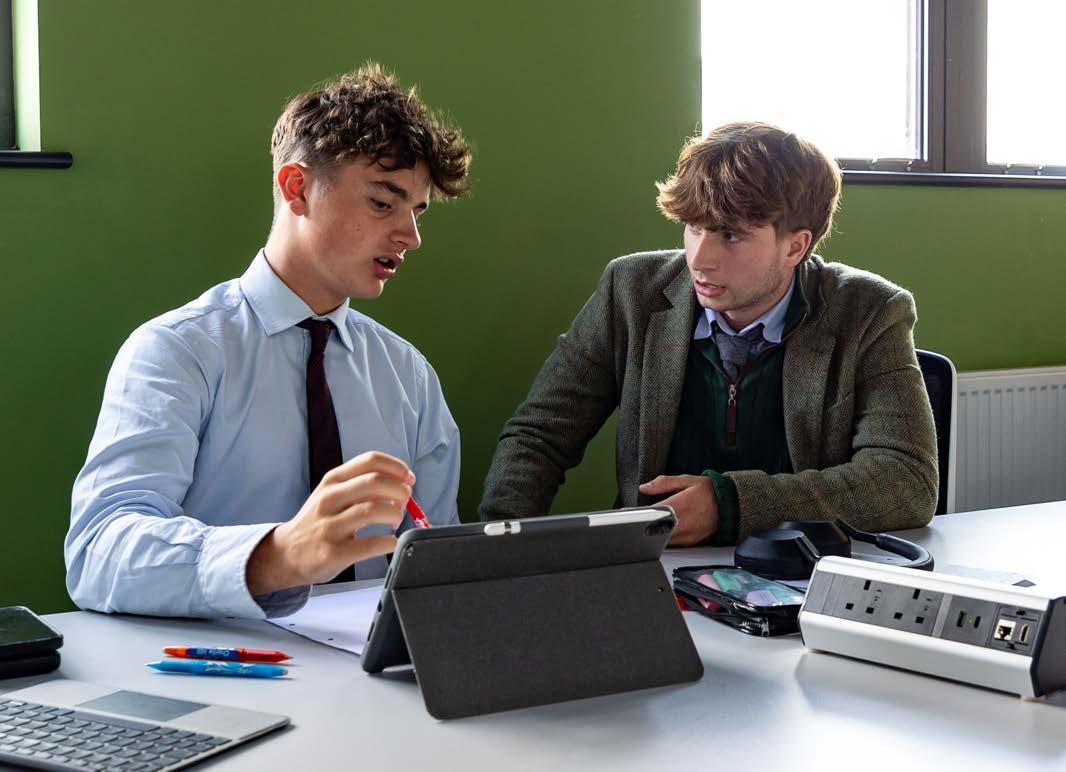
OVERVIEW
COURSE OUTLINE
METHOD OF EXAMINATION
Music at A Level is not intended just for pupils aiming to study music at a university or conservatoire. It is equally suitable as one of a mixed group of subjects leading to qualifications in other areas. It is highly facilitating, rigorously academic, creative and very practical, covering a wide range of valuable skills; independent learning, teamwork, presentation skills, active and critical listening, essay writing, confidence and creativity.
Component one: Performing
This is based on you playing or singing solo, in an ensemble, improvising, or using music technology. You have regular rehearsals with an experienced accompanist who can guide and assist. Typically, the very best marks are achieved by performing pieces at or above grade 6 standard.
Component two: Composing
One route teaches formal harmony techniques such as 4-part harmony and the completion of Bach chorales, the other teaches free composition in a range of styles, including the department’s specialist areas of choral music, jazz, pop and both contemporary and traditional instrumental music.
Component three: Appraisal
Pupils acquire deeper knowledge and understanding of musical elements, contexts and language, as well as aural responses, by means of both short questions, short essays and extended writing. There are three areas of study:
1. Western classical tradition (specific examples of Baroque concerto, Mozart opera and romantic piano Music by Brahms, Chopin and Grieg);
2. Popular music (based around the study of classic songs by the likes of Stevie Wonder, Beyoncé, Muse, Daft Punk, Labrinth and Joni Mitchel);
3. Jazz (including Pat Metheny, Miles Davis and Louis Armstrong).
• Performing is worth 35%, and the recital for the non-examination assessment is six to seven minutes long.
• Composing is worth 25%, and candidates produce about five minutes of music for the non-examination assessment.
• Appraising is assessed by means of the only written examination which is two hours long and worth 40%
ENTRY REQUIREMENTS
NEXT STEPS
CONTACT
You will need to be committed to playing, studying, and listening to music. A Level candidates can access the best marks in the performance units performing at grade 5 in Lower Sixth, and grade 6 in Upper Sixth.
AQA A Level Music
7272
Universities and employers are very interested in music A Level due to the wide range of transferable skills acquired during study. All universities recognise music A Level as a rigorous and academic subject, and its balance with other A Levels is welcomed for all university courses. Many former A Level musicians have gone on to take university and conservatoire degrees in music at the very best universities.
Alumni music graduates have gone on to work in many fields, including law, as administrators for arts organisations, as accountants, running businesses, teaching, in research and education, as well as performing.
Mr Peter Tamblyn, Director of Music pt@exeterschool.org.uk
OVERVIEW Physics is the study of the natural world all around us, from the fundamental building blocks of matter to the large-scale structure of the universe and all the multitude of scales in between. It allows us to gain a better understanding of how things work and attempts to answer some of the most fundamental questions about the world we live in. The study of physics develops problem solving and mathematical skills, as well as other transferable skills such as logical, analytical and creative thinking. Importantly, physics also helps to solve real world problems for both people and the planet.
COURSE OUTLINE
The material covered during the study of physics in the sixth form is split into nine topics.
Many of these are extensions of areas studied in physics at GCSE whilst some are newer, more fundamental and even more exciting. Each topic includes a mixture of experimental work and theory components, along with an analysis of wider applications. In the Lower Sixth, the topics studied are:
1. Measurements and their errors: doing and analysing practical work effectively
2. Particles and radiation: a look at fundamental ideas in particle and quantum physics
3. Waves: the mathematical study of waves and their many uses and applications
4. Mechanics and materials: the study of dynamics, forces and energy and basic material science
5. Elec tricity: extending ideas at GCSE to understand and use electrical circuits
In the Upper Sixth, the topics studied are typically more mathematical and more in-depth and so are even more interesting:
1. Further mechanics and thermal physics: circular and oscillatory motions and thermal physics
2. Fields and their consequences: the study of gravitational, electric and magnetic fields
3. Nuclear physics: further understanding of the nucleus and its many applications including fission and fusion
4. Option topic: as a set, there is a choice of medical physics, astrophysics, engineering physics or turning points in physics.
METHOD OF EXAMINATION Three two-hour written examinations, assessing the work from both years. The papers will contain a mixture of multiple choice, short and long answer questions. One paper each will focus mainly on material from the Lower Sixth and Upper Sixth years respectively. The final paper will assess practical techniques and data analysis as well as the chosen option topic. At A Level, there is also a practical endorsement (pass grade only). This is assessed as a series of set practical tasks completed throughout the two-year course.
ENTRY REQUIREMENTS Minimum GCSE physics grade 6 or GCSE double award science grade 6,6 as well as minimum GCSE mathematics grade 6. However, a grade 7 or above is strongly recommended. A Level mathematics is not required but it is very beneficial.
EXAM BOARD AND ENTRY
OVERVIEW
COURSE OUTLINE
This course introduces you to the politics of the UK and USA, enabling you to develop an informed understanding of the historical and contemporary influences that shape the nature of government and politics in both countries. You will examine the ways in which people engage with politics, and the structure and effectiveness of the political systems that operate, by closely relating theory to current affairs. Careful examination of the key debates that surround issues such as party policy, the role of the legislatures, the nature of general and presidential elections, the respective roles of the judiciary and the protection of rights provide you with a detailed overview, and comparison of, modern politics in the UK and USA. Furthermore, you will be introduced to key political ideologies and learn how to evaluate and interpret political events through debate, discussion, and written work.
The course is divided into three separate components, offering pupils the opportunity to explore the following:
Component one: UK politics and core political ideas
• The nature of politics and how people engage in the political processes of the UK, exploring issues such as democracy and participation, political parties, electoral systems, voting behaviour and the media.
• The core principles of conservatism, liberalism, and socialism and how they apply to issues such as human nature, the role of the state and the shape of society.
Component two: UK government and non-core political ideas
• UK constitution and the specific roles and powers of the major branches of the government (including the PM, parliament, and the UK Supreme Court) and the relationships between them.
• The political ideas of anarchism, the ways it has developed over time, its core principles, and the divisions between different strands of anarchism and relevant influential thinkers.
Component three: Comparative politics
• The nature of the US constitution and the specific roles and powers of the major branches of government (including the presidency, Congress, and the US Supreme Court) and the relationship between them.
• Contemporar y issues such as US electoral processes and civil rights and a comparison between the politics and institutions of the US with those of the UK.
METHOD OF EXAMINATION
• Three, equally weighted exam papers – one for each of the above components.
• Each written exam is two hours long.
• From a choice, pupils select and answer source-based, essay and shorter answer questions.
• Some questions are compulsory.
• The assessment objectives require pupils to explain, analyse and evaluate political issues, concepts, and information.
ENTRY REQUIREMENTS
A Level Physics 7408
NEXT STEPS Physics is offered at a wide selection of universities but there are also a huge range of physics-related degrees including: engineering, medicine, astrophysics, geophysics, materials science, computer science and the natural sciences. Physics offers a vast array of career options and physicists are very much in demand both in physics and engineering but also sectors such as finance. Employers actively seek out people who can prove their ability to think logically, understand complex ideas, problem solve, and apply ideas to the real world – skills developed in physics can help give you the edge.
CONTACT Mr Dominic Tuohey, Head of Physics dlnt@exeterschool.org.uk AQA
NEXT STEPS
CONTACT
No specific subject grades are required. Strong reading, writing, analytical and debating skills are an advantage. You should, above all, be interested in current affairs with a willingness to watch quality news programmes and read newspapers.
Edexcel A Level Politics 9PL0
Politics combines well with other A Levels such as economics, history, geography and English literature. It is a highly valued A Level that regularly provides a route into Oxbridge and Russell Group universities. It is a great introduction to many undergraduate courses, including PPE (Oxford), HSPS (Cambridge), and other widely offered politics and international relations courses. There are many attractive degree courses that combine politics with the study of other disciplines such as languages or law. Politics demands high levels of analytical skill and is therefore potentially attractive to employers, particularly in combination with modern languages or other subjects.
Mr Richard Baker, joint Head of Politics rjb@exeterschool.org.uk
Mrs Melanie Sheehan, joint Head of Politics mfs@exeterschool.org.uk
OVERVIEW Have you ever wondered what it is that makes some people behave the way they do? For example, what turns someone into a psychopath or makes someone afraid of spiders? How can different things affect your mood and even your confidence? Psychology is the scientific study of the mind and human behaviour. Not only will you gain insights into the human mind, but you will also participate in practical experiments that will enable you to understand the causes of human behaviour and how to change it.
COURSE OUTLINE The A Level psychology course will involve your analysing, interpreting, and evaluating psychological concepts, theories, research studies and research methods. You will evaluate different therapies and treatments in terms of their appropriateness and effectiveness and will also carry out several practical research activities including the use of statistics and maths to interpret data. There are three main units:
1. Introductory topics in psychology (33.3%)
This unit covers social influence, memory, attachment, and psychopathology.
2. Psychology in context (33.3%)
This unit includes approaches in psychology, biopsychology and research methods.
3. Issues and options in psychology (33.3%)
This unit includes the study of the major issues and debates in psychology, aggression, cognition and development and eating behaviours.
It is important to realise that psychology A Level requires a high level of analytical and mathematical skills. Overall, at least 35% of the marks in assessments for psychology will require the use of mathematical skills (at least at the standard of higher tier GCSE mathematics) and scientific research methods.
OVERVIEW
METHOD OF EXAMINATION
ENTRY REQUIREMENTS
EXAM BOARD AND ENTRY
Three two-hour written examinations, assessing the work from both years. The papers will contain a mixture of multiple choice, short and extended answer essay questions.
Minimum GCSE grade 6 in both biology (or 6,6 in double award science) and mathematics, although a grade 7 is preferred. There is no requirement to have studied any psychology before.
AQA
A Level Psychology 7182
NEXT STEPS Psychology develops a range of valuable skills, including critical analysis, independent thinking and research which are transferable to further study and the workplace. It therefore fits easily with many other subject areas and career choices including medicine, dentistry, nursing, management, advertising, teaching, research, market research and statistics.
To pursue a career specifically in psychology, you will need a degree that has been endorsed by the British Psychological Society and an appropriate postgraduate qualification e.g. in clinical psychology, educational psychology, occupational psychology or forensic psychology.
CONTACT Mrs Claire Gooddy, Head of Psychology cg@exeterschool.org.uk
COURSE OUTLINE
This course incorporates a variety of academic disciplines and is available to all. It offers variety and rigour and requires you to play an active role through discussion and enquiry. It is challenging and will make you question long-held ideas and look at how we make moral decisions in life. Whilst not an A Level purely in philosophy, two thirds of the course is philosophically based and so it will provide a good introduction to philosophy for those interested in that subject.
This is the Religious Studies syllabus offered by Eduquas, comprising of three components: religion and ethics, philosophy of religion and study of Christianity.
1. Religion and ethics: you look at what it means to say something is ethical or moral. You consider what it means to call ethical theory absolutist, objective, relativist and subjectivist. Several ethical theories are studied:
• Natural law, situation ethics, utilitarianism, religious ethics, Kantian ethics and libertarianism
You apply these theories to the following ethical topics:
• Abortion, euthanasia, war and peace and genetic engineering
2. Philosophy of religion: you will undertake an in-depth and broad study of fundamental philosophical themes ranging from arguments for the existence of God to the use of religious language. This is broken down into four themes:
• Cosmological, teleological, and ontological arguments for the existence of God
• Challenge religious belief about evil and suffering. Philosophers such as Freud, Jung and Epicurus are studied
• Religious experience, including arguments surrounding near death experiences
• Religious language and the problems associated with the use of language, referring to scholars such as Wittgenstein and Phillips
3. A study of religion: You will study Christianity under the following themes:
• Religious figures and sacred texts
• Religious concepts and religious life
• Significant and historical developments in religious thought
• Christian practices that shape religious identity
METHOD OF EXAMINATION
ENTRY REQUIREMENTS
EXAM BOARD AND ENTRY
NEXT STEPS
The course is assessed with three two-hour exams.
Required GCSE subject: English at grade 6 or better. It is not necessary to have religious studies at GCSE. An interest in ethics, philosophy, development of ideas and an enquiring mind are essential.
Eduqas
A Level Religious Studies A120PA
Pupils who take A Level Religion, Philosophy and Ethics sometimes go on to study theology or philosophy or a wide variety of other disciplines and they often establish successful careers in the increasing number of jobs that require an element of religious literacy. Previous A Level pupils are now in the police, teaching, law, social work, higher education, journalism, business, the civil service and a whole host of other professions. The skills required to be successful in the course, and developed through it, are highly prized by universities and employers alike.
CONTACT Mr John Gooddy, Head of Religious Studies jfmg@exeterschool.org.uk
OVERVIEW A BTEC provides a unique combination of technical skills that help prepare you for higher education together with a breadth of knowledge about the sector that empowers you to succeed in the real world. This course is designed for individuals with a genuine interest in sport and good general knowledge, as much of the course will involve linking theory that is learned through sporting examples. Successful pupils will be highly motivated and able to consistently meet coursework deadlines.
You will not be directly assessed on your sporting ability. However, there are some practical elements of the course that require you to be motivated, enthusiastic and able to regularly participate in practical lessons. You should be willing to take part in practical activities and be able to work with others.
COURSE OUTLINE
METHOD OF EXAMINATION
This qualification is equivalent to a single A Level and is an academic, practical, and vocational course. You learn by completing projects and assignments that are based on realistic workplace situations and activities in addition to several externally set tasks and exams. You will study four units of which three are mandatory and one is optional. The mandatory content is equal to 83% of the course, with external assessments equal to 67% of the total qualification.
The mandatory units are anatomy and physiology, fitness training and programming for health, sport and well-being and professional development in the sports industry. The optional unit is sports psychology.
You will learn in a variety of styles during this BTEC Level 3 course. You will have both theory and practical lessons and will be able to apply your understanding from theory lessons to practical situations or via activities that will stimulate understanding and application. You will have exam style assessments and homework throughout the two-year course and are expected to keep physically active and try out different sports to widen your knowledge and understanding of sporting methods and skills.
The anatomy and physiology unit is assessed by a 1 hour 30 externally marked exam.
The unit on fitness training and programming for health, sport and well-being is also externally marked and is entirely essay based; it is a rigorous 2-hour 30 exam. Both these units are completed at the end of year one.
The third unit is professional development in the sports industry and consists of two assignments and the sports psychology unit consists of 3 assignments. These are internally assessed, marked by teachers and externally verified.
CONTACT Mrs Emily Kimberley, Head of BTEC Sport ejk@exeterschool.org.uk Pearson
BTEC Level 3 National Extended Certificate in Sport 601/7218/6
sport can lead on to degrees such as sport and exercise science, sport coaching and development, sports therapy, sports management or sports journalism. In addition, BTEC sport can help support applications for university study in other fields in combination with your A Levels. You will need to check in advance that universities and courses that you might be interested in will accept a BTEC in addition to A Levels.

An Exonian character education stretches far beyond the constraints of the classroom, timetable and examination specifications.
These are all available to pupils and are extensively used by sixth formers. The school regularly runs sports tours, the latest being a hockey tour to the Netherlands and a rugby tour to Portugal.
In the sixth form pupils are able to choose from an extensive range of competitive and recreational sports as well as health and fitness options during the Wednesday games programme. These include the major sport of the term (cricket, football, hockey, netball and rugby) as well as badminton, body conditioning, spin classes, weights and fitness training, climbing, cross-country, shooting, squash, swimming, basketball, and tennis. The central aim is to make sport and physical activity an integral part of every Exeter School pupil’s school experience and weekly routine, and you will have the opportunity to immerse yourself in a wealth of social and competitive sport and physical activity both during your game’s session and the extra-curricular clubs and practices. We want all our pupils to find a sport or activity that they are passionate about and one they will continue to participate in when they leave school. There is also the opportunity for pupils to represent the school in a range of sports with extensive fixture cards both on Saturdays and mid-week, and elite programmes that challenge the best athletes and teams.
The onsite facilities include a climbing wall, fitness suite, athletic development gym, squash courts, sports hall, multipurpose studio, indoor rifle range and a 25-metre indoor swimming pool.
There are many opportunities for pupils to be involved in music through the school orchestras, bands and choirs and to take part in school plays or assist with work behind the scenes as stage crew, make-up artists or lighting assistants. The music department runs music tours biennially; in the summer of 2024, musicians travelled to Lake Garda and will be visiting Germany in the summer of 2026.
The senior school play follows a threeyear rotation, with a musical one year, Shakespeare the next, and a straight play in the final year of the rotation. In 2024, senior school pupils put on a successful performance of Blue Stockings, with 2025 showcasing their talents in Grease.
Those with an interest in outdoor pursuits can develop this through the CCF, Duke of Edinburgh's Award Scheme or Ten Tors. Several subjects also run field-work trips in the UK and abroad.
In the sixth form you can enter the Ten Tors in 45 and 55 mile teams. The school also runs its own ‘1633 Challenge’, which is run on similar lines to Ten Tors and enables all those who have undertaken the training to demonstrate their abilities and receive a certificate upon completion.
In 2025, members of the Upper Fifth and the sixth form travelled to Kenya and in the spring term of 2026 it is skiing!
The Friday 8 programme involves activities that pupils carry out from 3.20pm until around 4.45pm and is designed to further enhance a wide range of pupils’ ‘softer’ skills, such as leadership, teamwork, and communication. Pupils in Years 10 and 11 at Exeter School will have either taken part in the Combined Cadet Force (CCF) or the Duke of Edinburgh's (DofE) Award. On reaching the sixth form, they either carry on with their current activity or try one of several alternative options. New entrants can choose any of the options below including CCF or DofE, even if they have not done one of these before.
Combined Cadet Force: our CCF section is one of the largest in the Southwest and offers an impressive range of options and activities to cadets. The aims of the CCF are to develop pupils’ leadership skills, teamwork, and resilience through the structure of a cadet unit where these skills are nurtured and respected. The CCF has three sections reflecting the three services of the British armed forces.
The Royal Navy section’s activities centre around afloat training and the RN syllabus, presenting cadets with an impressive range of opportunities to develop their skills.
The army section’s syllabus is built around basic infantry skills development, offering opportunities such as fieldcraft, weapon handling and survival training to name a few.
The Royal Air Force section has a strong ethos of teamwork and leadership, with high standards of developing military skills, which are tested in regular competitions. Flying is also a significant part with a flight simulator and trips to fly Grob Tutor aircraft.
All sections run a leadership programme in the sixth form so that sixth form cadets are responsible for planning and delivering the training for the junior cadets. Each section has an annual summer camp and there is a

wide range of courses on offer that are run by the MOD at little or no cost to cadets.
Duke of Edinburgh’s Gold Award: this is universally recognised by university entrance boards and businesses as a leading programme for the personal development of young people. In the words of Steve Backshall, naturalist, explorer, presenter and writer: “Your DofE shows you have fortitude and the ability to stick to a task, which is recognised by universities and employers alike.” The school is determined to make the award enjoyable, challenging and of the highest quality and the widest reach.
The award has five sections: volunteering, skills, physical recreation, expeditions, and a residential project. All activities are usually undertaken in your free (i.e. non-directed) time and are often lunchtime, after-school or weekend activities. Since the award is often an extension of a young person’s personal interests and activities and has a long completion time, the award can fit around school or other work quite easily.
The Exonian editorial team: this is a small, dedicated group of sixth

formers who write and edit the annual school magazine The Exonian
They work throughout the school year gathering stories about junior and senior school events, trips, and activities, writing, and editing articles and selecting accompanying photographs. Pupils may also be asked to interview visiting speakers and other guests, which requires careful research and advanced planning. The team also participates in trips and activities relating to the fields of journalism,
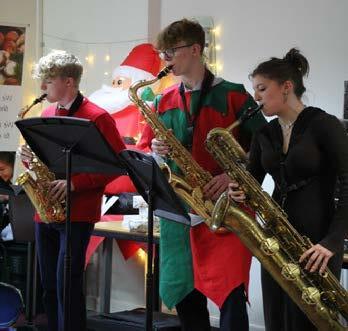

design, and publishing. Being a member of The Exonian editorial team is a valuable experience if you have a wider interest in media, creative writing and graphic design and is a must if you wish to apply for related courses at degree level.
Community service: this is a chance to give back to the local community and make a difference. There are many ways to get involved e.g. running clubs here in school, or listening to young readers in local junior schools, volunteering at the West of England School for the Partially Sighted, or helping out in charity shops or church groups, helping at youth clubs, or with the Cubs or Brownies.
Many pupils enjoy visiting older people in our community, either in their own homes or through some of the
residential care homes in St Leonards. The annual Christmas tea party in December, when the group welcomes over a hundred local senior citizens, as well as the annual coach outing in the summer for a small number of guests, are highlights of the year. There really is something for everyone to suit all talents or interests.
Sports Leaders: this is aimed at aspiring coaches or young leaders whilst developing organisational and presenting skills. This is a chance to ‘give back’ to the younger pupils at the school. Year one of the course is spent learning how to coach with a mixture of practical and theory sessions.
Content includes identifying and using different teaching styles, methods of practice, guidance, and feedback. This helps develop coaching philosophy.

Year two is spent learning about the role of the coach. This will involve learning about the key principles of leadership, group dynamics, attitudes, and attribution theory. Both years involve one hour a week helping to coach a junior age group team or activity. Unlike other sports leaders’ courses, this is not examined, nor does it come with a certification. Selection is based upon commitment to school sport throughout the years and coaching experience/interest.
Gold Arts Award: offers pupils the opportunity to further develop leadership skills, and show commitment to the community, as well as developing their interest in the arts beyond the curriculum. At Exeter School we offer either the drama or the art route.
The Gold Arts Award is a programme designed to challenge pupils which is also worth 16 UCAS points, allowing it to be used to strengthen university applications. It involves pupils creating their own artistic work, learning new artistic skills, reviewing dramatic works and facilitating arts projects for young people.

Swunk: this is a jazz and funk band comprising some of the best musicians in school. Some may never have played jazz music before. The band is an invitation-only group, curated each summer by the band’s director, jazz guitarist and top session musician Mr Bowen. The band typically comprises rhythm section members (piano, guitar, bass and drums) as well as front line players (typically trumpet, saxophone and trombonists) and a vocalist. Close attention is paid to chamber-group ensemble techniques, as well as to the vocabulary of improvisation, within a huge variety of styles, ranging far beyond swing and funk, to frequently include Reggae, Bossa Nova and
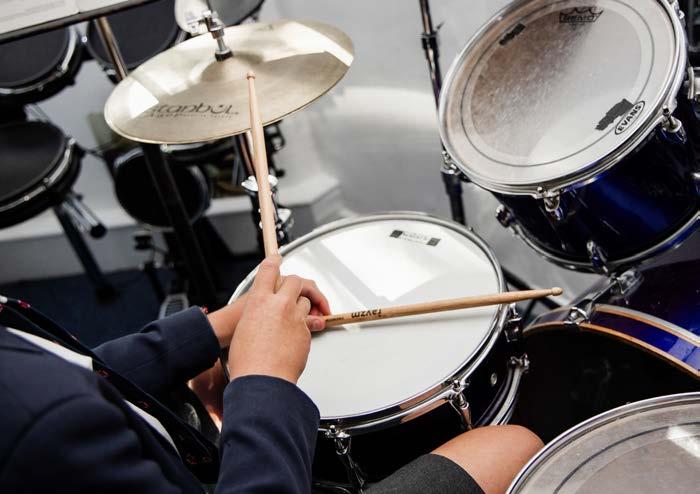
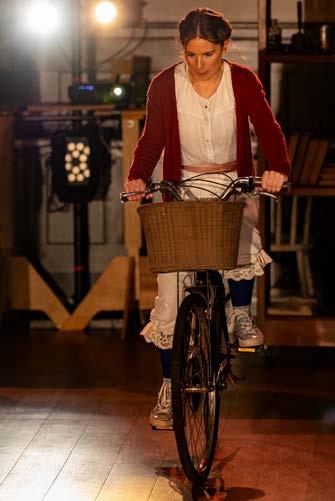
Exeter School aims to be as accessible as possible to applicants who would benefit from its academic, cultural, sporting and wide extra-curricular provision. We encourage all families to consider Exeter School, regardless of whether they feel they can afford the full tuition fees. We do our best to admit and support a wide variety of pupils from many diverse backgrounds.
Hip-Hop. Their many regular events throughout the year include workshops and performances at local primary schools, particularly the annual jazz concert, as well as one-off gigs both inside school and in the wider community.
The governors of the school recognise that many of its parents must make considerable sacrifices to secure their children’s education and fees are set at levels which represent excellent value for money, particularly considering the opportunities offered by the school. Financial assistance falls into two categories:
BURSARIES
Bursaries are means-tested awards based on parental circumstances and are awarded on an annual basis. They are available to external candidates who meet the school’s academic entry requirement and whose parents could not afford to send their child to Exeter School without financial assistance.
The financial support available through the school’s bursary programme is limited and applications must be supported by a full, written, verified statement of financial circumstances. Parents who wish their children to be
considered for a bursary should make an application by completing the form available from the Director of External Relations once they have confirmed their child is a candidate for the coming year, the child has been registered, and the registration fee paid. There is help with registration fees if needed.
All applications for support for the year 2026/27 must be received by Friday 9 January 2026 The assessment process will include a home visit by an agent employed by the school. As a general guide, gross parental income will need to be below £60,000 per annum to be considered for a bursary.
As part of its bursary programme, Exeter School can offer free places in the sixth form because of donations and legacies from former pupils and grants from local charities.
• The St John’s Hospital Educational Foundation grant offers up to three full bursaries for sixth form entry.
• The George Williams Bursaries offers up to two free places to study the sciences at sixth form. These bursaries have been made possible by a generous bequest and continuing donations from the estate of a prominent deceased former pupil.
• The Bob Griffin Bursary provides financial support for pupils entering the sixth form to study modern foreign languages.
Scholarships are awards based on merit and excellence. They are awarded for current and new pupils entering Lower Sixth, with outstanding ability or talent in the fields of sport, music, art and drama. Like many schools, scholarships do not have an accompanying fee remission, but means-tested bursaries can be applied.
for their teaching and research work.
We are very proud of our pupils who have secured places across a range of leading universities,
Destinations include Birmingham, Bristol, Durham, Exeter, Glasgow, Imperial College, King’s College, Leeds, Sheffield, St Andrew’s, Warwick and York. There are typically around a dozen pupils who accept medical places each year. Pupils have also gone on to study a broad range of subjects including biology, business
management, chemistry, criminology, earth sciences, economics, engineering, English literature, geography, history, international relations, law, liberal arts, marine biology, materials science, mathematics, modern foreign languages, physics, politics, psychology and sociology, among others.
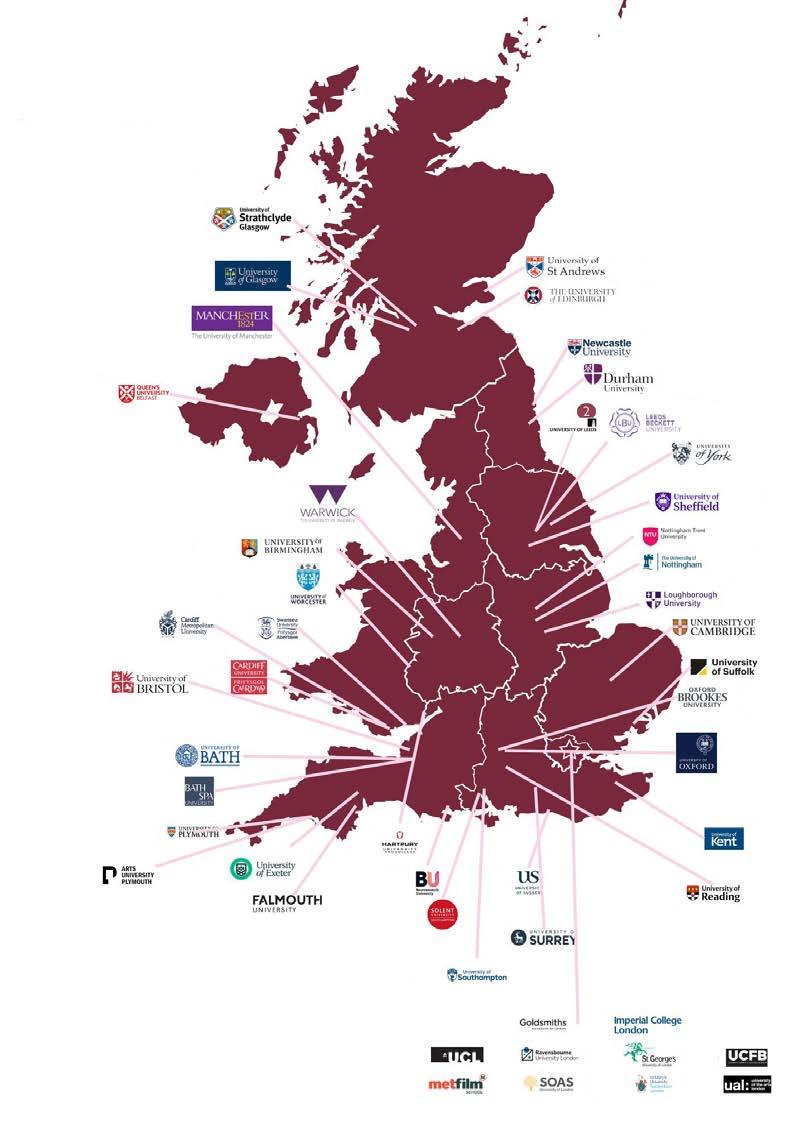
A* Grades – 17%; A*A Grades – 55%; A*AB Grades – 84%
BTEC Results
Entries
